Luna (Lindsey) Corbden's Blog, page 10
December 25, 2011
Peace on Earth, Good Will To Men
I've had a lot of mixed feelings about Christmas over the years. As a kid, I felt alternately excited and guilty. Excited: obvious. Guilty because my parents went overboard when buying me gifts, and I never seemed to have enough money to buy them anything they really wanted, and I was bad at buying gifts anyway.
When I was a teen, the excitement gave way to guilt and fear. Fear that I wouldn't be excited enough or grateful enough or happy enough that I'd forget to buy gifts, which I usually did. I secretly hid a lot of depression and social anxiety as a teen, and Christmas really brought that out. At holiday family gatherings I was often at the brunt of most of the teasing. There were peaceful and loving moments during this time as well, but I tend to forget those since pain is much louder than joy.
In my early twenties, as a single mom, I had a couple of really great Christmases. I was on my own, in my own place, making my own choices. I found a lot of spirituality and peace during this time. I was still Mormon, and my boy really small. Everything was very magical at this time in my life, and somehow I tapped into the "True Meaning of Christmas". I remember listening to a lot of music, like Mannheim Steamroller and a Mormon production called The Forgotten Carols (both of which I would still recommend to this day). A Fresh Aire Christmas had a lot of choir music that is really beautiful, like Veni Veni, Emmanuel.
When I lost religion, I became very cynical around Christmas. Its blatant commercialism became clear to me, which rang chimes with my feelings of guilt and fear as a child. I had mixed feelings about the idea that only a baby god child could bring peace to the earth... a peace which never seemed to come, in spite of the promises of angels on high.
My son had to suffer this attitude from me through most of his childhood. I also saw Christmas as a burden: just one more thing to do in my busy life and more money that had to be spent when money was tight. I still hate putting up Christmas decorations, and have left this task to him.
This year, I've had a recurring theme to my Christmas season, one I've chosen to embrace. Peace. One simple word with so many meanings. Over the month, a refrain has gone through my mind: "Peace on earth good will to men" sung to the melody written by Handel. Of all the messages one can get from the Bible, this is one we should embrace.
Yet this is not the central theme of American Christian culture. Even though Christianity has permeated nearly everything we do, even those of us who are agnostic and atheist, we somehow cannot shake our desire for violence. Strength is to be admired. Gentleness is to be laughed at. Stars and hearts and puppies are for "little girls" and people who play or fight poorly are like little girls. (Didn't Jesus say we should be like little children?) Hippies are flippy-wristed weaklings who are just waiting to be victimized. Pacifists and vegans are to be mocked. Anyone who wishes to conserve the dwindling resources of this planet are idiots who just want to take away everyone's toys. Those who raise protesting voices against third-world slavery are ignorant, and this is how it must be.
There's this fear that if we give peace an inch, it might take over, and we might end up loving people we'd really rather not love.
I know these feelings because I struggle with them myself. I feel cognitive dissonance, because culture has programmed me to think these things. To feel these things.
But why? What's so wrong with peace? Is it a lofty ideal? Yes. Is it unrealistic? Maybe. But why does it need to be vilified? Why should adherents to peace be mocked? What is so dangerous about a message of peace that it must be marginalized?
There isn't a major religion on earth that doesn't at least pay lip service to the concept of peace. Any religion that can't claim to be peaceful is rejected by a majority of potential converts (even if those converts are being converted at the point of a sword). Yet the prevailing meme, in the form of ideas and feelings, is toughness, strength, bullying, and war. Concepts of compromise and diplomacy are "weak" and "fluffy" and "unrealistic". But maybe these ideas are unrealistic because any who are espouse them are ridiculed.
In our readiness to "speak softly and carry a big stick", we forget the speak softly part. Should we as individuals and a society be ready to defend ourselves? Absolutely. But instead of being a last resort, it tends to be the first. If our culture embraced peace as much as we claim we do, if we really sought peace, we would have more of it. We would challenge our leaders for every war they wished to fight. We would make them offer the same level of proof we require of prosecutors in a court of law. They would be required to prove, beyond a shadow of a doubt, that the war is absolutely necessary to defend our country.
Maybe instead of sending men off to die, we might have to go without a few resources. Some prices might go up. What price of oil or cheap goods is high enough that it pays for the lives of soldiers who may come back alive and unmaimed, but who will be scarred forever? If we go to war, it should be for one reason: That another country has initiated force against us, or our military allies, first.
This season, I have looked within, and seen the side of me that rejects peace. I have faced it, and found that in spite of its power, it is still silly. Peace is more rational than violence. Peace is smarter than war. It is not touchy-feely to believe in peace: it is logical.
May we all have gentle hearts in this coming year. God has been unable to bring us peace, so let's bring it to ourselves.
I have compiled a list of Christmas songs about peace, which I will link in the next post. Merry Christmas to all, and to all a good night.
When I was a teen, the excitement gave way to guilt and fear. Fear that I wouldn't be excited enough or grateful enough or happy enough that I'd forget to buy gifts, which I usually did. I secretly hid a lot of depression and social anxiety as a teen, and Christmas really brought that out. At holiday family gatherings I was often at the brunt of most of the teasing. There were peaceful and loving moments during this time as well, but I tend to forget those since pain is much louder than joy.
In my early twenties, as a single mom, I had a couple of really great Christmases. I was on my own, in my own place, making my own choices. I found a lot of spirituality and peace during this time. I was still Mormon, and my boy really small. Everything was very magical at this time in my life, and somehow I tapped into the "True Meaning of Christmas". I remember listening to a lot of music, like Mannheim Steamroller and a Mormon production called The Forgotten Carols (both of which I would still recommend to this day). A Fresh Aire Christmas had a lot of choir music that is really beautiful, like Veni Veni, Emmanuel.
When I lost religion, I became very cynical around Christmas. Its blatant commercialism became clear to me, which rang chimes with my feelings of guilt and fear as a child. I had mixed feelings about the idea that only a baby god child could bring peace to the earth... a peace which never seemed to come, in spite of the promises of angels on high.
My son had to suffer this attitude from me through most of his childhood. I also saw Christmas as a burden: just one more thing to do in my busy life and more money that had to be spent when money was tight. I still hate putting up Christmas decorations, and have left this task to him.
This year, I've had a recurring theme to my Christmas season, one I've chosen to embrace. Peace. One simple word with so many meanings. Over the month, a refrain has gone through my mind: "Peace on earth good will to men" sung to the melody written by Handel. Of all the messages one can get from the Bible, this is one we should embrace.
Yet this is not the central theme of American Christian culture. Even though Christianity has permeated nearly everything we do, even those of us who are agnostic and atheist, we somehow cannot shake our desire for violence. Strength is to be admired. Gentleness is to be laughed at. Stars and hearts and puppies are for "little girls" and people who play or fight poorly are like little girls. (Didn't Jesus say we should be like little children?) Hippies are flippy-wristed weaklings who are just waiting to be victimized. Pacifists and vegans are to be mocked. Anyone who wishes to conserve the dwindling resources of this planet are idiots who just want to take away everyone's toys. Those who raise protesting voices against third-world slavery are ignorant, and this is how it must be.
There's this fear that if we give peace an inch, it might take over, and we might end up loving people we'd really rather not love.
I know these feelings because I struggle with them myself. I feel cognitive dissonance, because culture has programmed me to think these things. To feel these things.
But why? What's so wrong with peace? Is it a lofty ideal? Yes. Is it unrealistic? Maybe. But why does it need to be vilified? Why should adherents to peace be mocked? What is so dangerous about a message of peace that it must be marginalized?
There isn't a major religion on earth that doesn't at least pay lip service to the concept of peace. Any religion that can't claim to be peaceful is rejected by a majority of potential converts (even if those converts are being converted at the point of a sword). Yet the prevailing meme, in the form of ideas and feelings, is toughness, strength, bullying, and war. Concepts of compromise and diplomacy are "weak" and "fluffy" and "unrealistic". But maybe these ideas are unrealistic because any who are espouse them are ridiculed.
In our readiness to "speak softly and carry a big stick", we forget the speak softly part. Should we as individuals and a society be ready to defend ourselves? Absolutely. But instead of being a last resort, it tends to be the first. If our culture embraced peace as much as we claim we do, if we really sought peace, we would have more of it. We would challenge our leaders for every war they wished to fight. We would make them offer the same level of proof we require of prosecutors in a court of law. They would be required to prove, beyond a shadow of a doubt, that the war is absolutely necessary to defend our country.
Maybe instead of sending men off to die, we might have to go without a few resources. Some prices might go up. What price of oil or cheap goods is high enough that it pays for the lives of soldiers who may come back alive and unmaimed, but who will be scarred forever? If we go to war, it should be for one reason: That another country has initiated force against us, or our military allies, first.
This season, I have looked within, and seen the side of me that rejects peace. I have faced it, and found that in spite of its power, it is still silly. Peace is more rational than violence. Peace is smarter than war. It is not touchy-feely to believe in peace: it is logical.
May we all have gentle hearts in this coming year. God has been unable to bring us peace, so let's bring it to ourselves.
I have compiled a list of Christmas songs about peace, which I will link in the next post. Merry Christmas to all, and to all a good night.
Published on December 25, 2011 14:04
November 17, 2011
I Am the Crazy Uncle
The bond that links your true family is not one of blood, but of respect and joy in each other's life. Rarely do members of one family grow up under the same roof. - Richard Bach
I feel like I have become the Crazy Uncle of my family.
The timing is about right. My Crazy Uncle passed away about seven years ago, around the time I moved to Seattle, and about that time it was starting to be clear to most of my family that I wasn't Mormon anymore, and wasn't ever going to be again. My strange family has always tended toward estrangement. We were always too busy with our own activities, or caught taking sides in a who-hurt-whose-feelings war. But after that, whatever distance was already there just grew and grew.
My Crazy Uncle was weird because he took myth too far, with his conspiracy theories and demons and conspiracy theories about demons. He would call my mom every few months to talk her into buying gold or silver, or to invest in garnet mines or whatever scheme he'd gotten into his head. Because the economy was about to collapse, any minute, he'd say. Edgar Casey was right, he'd say. Mt. Rainier is going to blow up so you guys need to move to where it's safer, in Ohio. He'd had a vision, he'd say, and plead with my mom to take this action or that.
And now and then, she'd even be convinced by him, just a little. I remember the time we bought silver at $4.25 an ounce, and waited for it to shoot up in price like he said it would. We waited for the world to end so it would be worth something. But there it stayed at $4.25 an ounce for years.
I grew up in a system of thought that was waiting for the world to end anyway,
I am weird because I take reason too far. I don't believe in demons at all (although they are possible). I don't believe in God at all, or scripture. My minimum level of proof is set pretty high. I'm willing to believe a few supernatural things now and then, if they actually happen to me, but those are my special moments in life, and I take my own meaning from them. I share those experiences only rarely, and don't expect anyone else to believe me, and I only take them half-seriously at best. My Crazy Uncle and I are quite a bit different.
And yet I felt a kinship with him when he died. He lived 3000 miles away. I rarely talked to him over my lifetime, and frankly, I was scared of him. As he lay dying of cancer and my mom drove to visit him, I wondered if I was wrong to fear him. I feared his insanity (he was diagnosed schizophrenic). I feared the booby traps he was rumored to have set up in his room, my grandparent's attic. But more than that, I feared his demons and magic spells. Because those were just as real to a Mormon kid in the 1980s as schizophrenia. More real.
But as a thirty-year-old ex-Mormon living in my own apartment in Seattle, the only one of my huge family to ever leave the church (except for my Uncle who was a convert anyway), I started to feel some kind of kinship with my Crazy Uncle. At the time, I took a little pride in being the "black sheep", and in a way, realized I did fill his shoes. I wasn't crazy, but I'd shirked the traditions of my family, gone away to live a wild life in the big city. I experimented with life and beliefs, explored other religions. I read books on paganism and dabbled in tarot, because these things no longer scared me. They were myths perhaps, or marginalized non-Christian activities even if they were real. Totally harmless.
And in that, I finally "got" my uncle.
But I was still a little afraid of him.
I thought of writing a letter to him then. I don't think I ever wrote it, and if I did, I know I didn't send it. Inside I was still a little kid, and he the scary, smoking, coffee-drinking, multiple-time divorcee, occult-believing, demon-hearing old man that might set off a bomb if I dared enter his room. He would send evil spirits after anyone who got on his wrong side, so I was always supposed to speak very nicely to him.
My childhood fears got the better of me, and I did not write him a letter.
And now he is gone.
And I feel the cold-shoulder from my family.
It could just be the same level of distance that has always been there, this weirdly insular vibe of people too busy, people with lots of defenses, added to the 280 miles that separate us. It could be that usually I still feel like the little kid, the youngest sister, the teased and picked on nerd. Everyone else feels taller than me, more interesting, more talented, and more powerful. That is the place where I often fit in my imagination, even though I'm thirty-seven and have three kids of my own.
It could be my own powerful defenses are still raised up high. After all, I did spend years hating my family. And even more years feeling like I didn't belong. I probably hated them because I felt I didn't belong.
I don't reach out to them often myself.
But when I do? The line seems dead.
And it's sad, because my family is actually very cool. I should belong in my family. My nieces and nephews are all very smart. Somehow, in spite of the personal and emotional distance, even though I only saw them once or twice a year as they grew up, I have a lot in common with so many of them. Internet, computers, geek culture, science, art, creativity and senses of humor. I am old now, and have a lot to share about what it was like growing up geek in a time when geek wasn't cool. I know the roots of the memes they love so well. I see them from time to time, on Facebook or Twitter, sending links of this or that, getting into shows I've always loved or will love, creating and building really cool things.
But in spite of what we have in common, I sometimes forget there is one important thing we don't have in common. It is too strong a detractor.
I seem normal enough to myself. I'm in Seattle, living the life I've always dreamed, happy with an awesome family of my own, with normal problems and normal interests… Out here, it's not too unusual to be agnostic. And it's only a little unusual to be openly bisexual. And most people around here are not too disturbed about the polyamory thing. They could never imagine living that way themselves, but they're okay with it.
Around here, you can disagree on just about anything, and still be friends with someone. Because they are more likely to see what you do have in common. They see past the odd lifestyle. Those things aren't my identity more than my love of sci-fi and fantasy, my excitement when I hear about some new science breakthrough or at the launch of a new gadget or video game. Even people I know who are straight, Christian, and part of traditional families know that my chosen lifestyle is only a small part of who I am. It confuses me to see them like and accept me, to joke with me and share common interests with me, when my own family will hardly give me the time of day.
And then I remember what it was like to be a Mormon. I imagine my 18-year-old Mormon self looking at me here in the future. And now even being agnostic is cause for alarm. The tea I'm enjoying right now, the occasional cigarette, or the cocktail I have at the restaurant. Those things set me apart enough.
Then as I peel away the layers, looking deeper, I see the half-hearted paganism. Very creepy. (There could be evil spirits in my house right now just because of that.) I see the girlfriend and the boyfriend, and now I am off the edge. Crazy. Hedonistic. Immoral. Sex-crazed.
The differences my Mormon-self sees are greater than the things in common, monsters that reel up and block my view of the real human being who stands behind them.
And suddenly the cold shoulders and the distance and the uninvite from family Thanksgivings makes a lot of sense.
But no less sad. Because all of these things are who I am. I made these choices because they are a part of me, my psyche, a part of my spirituality, my destined path. To act otherwise would be to deny myself, to pretend and put on a show for the sake of others. And since honesty and integrity and openness are my highest values, I can make no other choice. I love my new family, too, and we have normal family problems, school, work, finances, arguments, chores, choosing between right and wrong. Just like everyone else in the world.
It's lonely, being the only one in my family to not be Mormon.
That is not true. There is one more now. One of my nieces left, a few years after me.
I tried to reach out to her once.
See, no one understands what it's like to be ex-Mormon. Non-Mormons don't understand — they were never Mormon. Mormon-hating mainstream Christians don't understand, because they could have told you all along Mormons didn't worship the true Christ. And Mormons most of all don't understand, because how could someone know what they know, and then stop believing?
There was a time in my life, when I'd send wall-of-text pages-long emails to ex-Mormons I thought would understand me. It was my way of saying, "We're alike! I get you! You're not alone! I'm not alone! OMG Let's be friends please please please!" Sometimes that actually worked, and I'd get a great wall-of-text email back. But regretfully, more often than not, I just scared people off.
But I hadn't learned that lesson yet, and of all the people who could understand my unique experience in life, I had hoped it would be my niece — someone who understood not only what it was to be ex-Mormon, but also someone from my unique family.
Nevertheless, the wall-of-text email I sent her went unanswered. A missed connection, a possible friend in my family, and I scared her off with my pages-long email rant. It's something I deeply regret, because she has as many interests in common with me as any of my real-world Seattle friends.
I do have a couple of nephews, almost-brothers because I grew up with them. I should still be close to them. One has been accepting of my choices, but still distant. No wonder. I've lost track of how many daughters he has, and he's a nurse. Very busy. The other nephew has been less accepting of my choices, and is just as busy with his own huge family and job.
My parents have been wonderful. After the initial troubles, they can't see enough of me, and I have to beat them off with a stick. My mother's weakness is her love. She loves every member of her family a little too much. And my dad is the same, only he tries his best not to show it.
But they're my parents, and that's their job to love me. Their daughter could never be their Crazy Uncle.
I could reach out to them, my extended family of origin, my brother and my sister, nieces and nephews, and nephews who are like my brothers. And I do, now and then, in timid little ways on Facebook and Twitter. I'll respond to a tweet or say happy birthday on Facebook. My sister and brother or one of my nephews will argue with some of my political Facebook posts now and then. And it's nice. I like to think that they're reaching out, saying that they care in their weird little ways. The same way I reach out and say I care in my weird little ways. Who can fault them for acting just like me?
I have a new family now, and my own Thanksgiving. We will fill the house with candles and food and music and joy and two-dozen people, just like any normal family would. I have more love and life than anyone could ever ask for. But I don't have my genetic family. Was it worth it? Was it worth giving up my family as the price of losing my religion?
Yes, absolutely. I'd rather have a good relationship with myself, be true to myself and my new family who loves me for who I am, than have a family of origin I have to pretend around, just so my facade can be loved instead of the True Me.
But that doesn't take the sting out of it. And it doesn't make me feel any less like I must be the Crazy Uncle.
I feel like I have become the Crazy Uncle of my family.
The timing is about right. My Crazy Uncle passed away about seven years ago, around the time I moved to Seattle, and about that time it was starting to be clear to most of my family that I wasn't Mormon anymore, and wasn't ever going to be again. My strange family has always tended toward estrangement. We were always too busy with our own activities, or caught taking sides in a who-hurt-whose-feelings war. But after that, whatever distance was already there just grew and grew.
My Crazy Uncle was weird because he took myth too far, with his conspiracy theories and demons and conspiracy theories about demons. He would call my mom every few months to talk her into buying gold or silver, or to invest in garnet mines or whatever scheme he'd gotten into his head. Because the economy was about to collapse, any minute, he'd say. Edgar Casey was right, he'd say. Mt. Rainier is going to blow up so you guys need to move to where it's safer, in Ohio. He'd had a vision, he'd say, and plead with my mom to take this action or that.
And now and then, she'd even be convinced by him, just a little. I remember the time we bought silver at $4.25 an ounce, and waited for it to shoot up in price like he said it would. We waited for the world to end so it would be worth something. But there it stayed at $4.25 an ounce for years.
I grew up in a system of thought that was waiting for the world to end anyway,
I am weird because I take reason too far. I don't believe in demons at all (although they are possible). I don't believe in God at all, or scripture. My minimum level of proof is set pretty high. I'm willing to believe a few supernatural things now and then, if they actually happen to me, but those are my special moments in life, and I take my own meaning from them. I share those experiences only rarely, and don't expect anyone else to believe me, and I only take them half-seriously at best. My Crazy Uncle and I are quite a bit different.
And yet I felt a kinship with him when he died. He lived 3000 miles away. I rarely talked to him over my lifetime, and frankly, I was scared of him. As he lay dying of cancer and my mom drove to visit him, I wondered if I was wrong to fear him. I feared his insanity (he was diagnosed schizophrenic). I feared the booby traps he was rumored to have set up in his room, my grandparent's attic. But more than that, I feared his demons and magic spells. Because those were just as real to a Mormon kid in the 1980s as schizophrenia. More real.
But as a thirty-year-old ex-Mormon living in my own apartment in Seattle, the only one of my huge family to ever leave the church (except for my Uncle who was a convert anyway), I started to feel some kind of kinship with my Crazy Uncle. At the time, I took a little pride in being the "black sheep", and in a way, realized I did fill his shoes. I wasn't crazy, but I'd shirked the traditions of my family, gone away to live a wild life in the big city. I experimented with life and beliefs, explored other religions. I read books on paganism and dabbled in tarot, because these things no longer scared me. They were myths perhaps, or marginalized non-Christian activities even if they were real. Totally harmless.
And in that, I finally "got" my uncle.
But I was still a little afraid of him.
I thought of writing a letter to him then. I don't think I ever wrote it, and if I did, I know I didn't send it. Inside I was still a little kid, and he the scary, smoking, coffee-drinking, multiple-time divorcee, occult-believing, demon-hearing old man that might set off a bomb if I dared enter his room. He would send evil spirits after anyone who got on his wrong side, so I was always supposed to speak very nicely to him.
My childhood fears got the better of me, and I did not write him a letter.
And now he is gone.
And I feel the cold-shoulder from my family.
It could just be the same level of distance that has always been there, this weirdly insular vibe of people too busy, people with lots of defenses, added to the 280 miles that separate us. It could be that usually I still feel like the little kid, the youngest sister, the teased and picked on nerd. Everyone else feels taller than me, more interesting, more talented, and more powerful. That is the place where I often fit in my imagination, even though I'm thirty-seven and have three kids of my own.
It could be my own powerful defenses are still raised up high. After all, I did spend years hating my family. And even more years feeling like I didn't belong. I probably hated them because I felt I didn't belong.
I don't reach out to them often myself.
But when I do? The line seems dead.
And it's sad, because my family is actually very cool. I should belong in my family. My nieces and nephews are all very smart. Somehow, in spite of the personal and emotional distance, even though I only saw them once or twice a year as they grew up, I have a lot in common with so many of them. Internet, computers, geek culture, science, art, creativity and senses of humor. I am old now, and have a lot to share about what it was like growing up geek in a time when geek wasn't cool. I know the roots of the memes they love so well. I see them from time to time, on Facebook or Twitter, sending links of this or that, getting into shows I've always loved or will love, creating and building really cool things.
But in spite of what we have in common, I sometimes forget there is one important thing we don't have in common. It is too strong a detractor.
I seem normal enough to myself. I'm in Seattle, living the life I've always dreamed, happy with an awesome family of my own, with normal problems and normal interests… Out here, it's not too unusual to be agnostic. And it's only a little unusual to be openly bisexual. And most people around here are not too disturbed about the polyamory thing. They could never imagine living that way themselves, but they're okay with it.
Around here, you can disagree on just about anything, and still be friends with someone. Because they are more likely to see what you do have in common. They see past the odd lifestyle. Those things aren't my identity more than my love of sci-fi and fantasy, my excitement when I hear about some new science breakthrough or at the launch of a new gadget or video game. Even people I know who are straight, Christian, and part of traditional families know that my chosen lifestyle is only a small part of who I am. It confuses me to see them like and accept me, to joke with me and share common interests with me, when my own family will hardly give me the time of day.
And then I remember what it was like to be a Mormon. I imagine my 18-year-old Mormon self looking at me here in the future. And now even being agnostic is cause for alarm. The tea I'm enjoying right now, the occasional cigarette, or the cocktail I have at the restaurant. Those things set me apart enough.
Then as I peel away the layers, looking deeper, I see the half-hearted paganism. Very creepy. (There could be evil spirits in my house right now just because of that.) I see the girlfriend and the boyfriend, and now I am off the edge. Crazy. Hedonistic. Immoral. Sex-crazed.
The differences my Mormon-self sees are greater than the things in common, monsters that reel up and block my view of the real human being who stands behind them.
And suddenly the cold shoulders and the distance and the uninvite from family Thanksgivings makes a lot of sense.
But no less sad. Because all of these things are who I am. I made these choices because they are a part of me, my psyche, a part of my spirituality, my destined path. To act otherwise would be to deny myself, to pretend and put on a show for the sake of others. And since honesty and integrity and openness are my highest values, I can make no other choice. I love my new family, too, and we have normal family problems, school, work, finances, arguments, chores, choosing between right and wrong. Just like everyone else in the world.
It's lonely, being the only one in my family to not be Mormon.
That is not true. There is one more now. One of my nieces left, a few years after me.
I tried to reach out to her once.
See, no one understands what it's like to be ex-Mormon. Non-Mormons don't understand — they were never Mormon. Mormon-hating mainstream Christians don't understand, because they could have told you all along Mormons didn't worship the true Christ. And Mormons most of all don't understand, because how could someone know what they know, and then stop believing?
There was a time in my life, when I'd send wall-of-text pages-long emails to ex-Mormons I thought would understand me. It was my way of saying, "We're alike! I get you! You're not alone! I'm not alone! OMG Let's be friends please please please!" Sometimes that actually worked, and I'd get a great wall-of-text email back. But regretfully, more often than not, I just scared people off.
But I hadn't learned that lesson yet, and of all the people who could understand my unique experience in life, I had hoped it would be my niece — someone who understood not only what it was to be ex-Mormon, but also someone from my unique family.
Nevertheless, the wall-of-text email I sent her went unanswered. A missed connection, a possible friend in my family, and I scared her off with my pages-long email rant. It's something I deeply regret, because she has as many interests in common with me as any of my real-world Seattle friends.
I do have a couple of nephews, almost-brothers because I grew up with them. I should still be close to them. One has been accepting of my choices, but still distant. No wonder. I've lost track of how many daughters he has, and he's a nurse. Very busy. The other nephew has been less accepting of my choices, and is just as busy with his own huge family and job.
My parents have been wonderful. After the initial troubles, they can't see enough of me, and I have to beat them off with a stick. My mother's weakness is her love. She loves every member of her family a little too much. And my dad is the same, only he tries his best not to show it.
But they're my parents, and that's their job to love me. Their daughter could never be their Crazy Uncle.
I could reach out to them, my extended family of origin, my brother and my sister, nieces and nephews, and nephews who are like my brothers. And I do, now and then, in timid little ways on Facebook and Twitter. I'll respond to a tweet or say happy birthday on Facebook. My sister and brother or one of my nephews will argue with some of my political Facebook posts now and then. And it's nice. I like to think that they're reaching out, saying that they care in their weird little ways. The same way I reach out and say I care in my weird little ways. Who can fault them for acting just like me?
I have a new family now, and my own Thanksgiving. We will fill the house with candles and food and music and joy and two-dozen people, just like any normal family would. I have more love and life than anyone could ever ask for. But I don't have my genetic family. Was it worth it? Was it worth giving up my family as the price of losing my religion?
Yes, absolutely. I'd rather have a good relationship with myself, be true to myself and my new family who loves me for who I am, than have a family of origin I have to pretend around, just so my facade can be loved instead of the True Me.
But that doesn't take the sting out of it. And it doesn't make me feel any less like I must be the Crazy Uncle.
Published on November 17, 2011 12:07
October 20, 2011
Why Crazy Wins
These days there's a lot of crazy. In all debates in the courts of public ideas, be they political, spiritual, moral, or cultural, the ideas most in the fringe seem to dominate.
In preparation for NaNoWriMo, I've been reading a lot about plot and story. 20 Master Plots and How To Build Them is an excellent resource, (as is Story by Robert McKee). Every plot must focus on drama, on the tension of an unresolved problem, an unreasonable antagonist, a goal worth dying for, overwhelming passions, major strengths, massive weaknesses. Unmovable objects vs irresistible forces.
Writers are encouraged to bring the tension to a tipping point; to make it seem like there is no way out, to stack the odds to the point where your protagonist is sure to lose (even if she wins in the end).
No matter the plot, there must be drama, or your reader will yawn and put the book down.
Frustrating conflict is great for stories. But it's not so great for real life. In real life, be it personal or political, drama leads to sadness, tears, hardships, and destruction. On the grander scale, it can lead to lost jobs, hunger, crime, injustice, and even death and war. In real life, it reaches a point where it is no longer entertainment, though it may seem so to viewers who watch it from afar.
All plots can be placed in two categories: Physical or mental, force or fraud, tragedy or comedy, outward action or inward movement. Whatever you call it, all plots emphasize one of these, while the other takes a backseat or doesn't exist at all. The action story will focus on physical resolution to tension. The murder mystery or romantic comedy will solve it via the mind or character development.
Back to real life. In the past, power was often won by force. There was no such thing as the Bill of Rights to protect people, so whoever could suppress the people at the point of the sword, or who ever could kill the king, won the day. Force is still very much a powerful tool, but in stable democratic nations, it is likely to backfire. And so today those who seek power must resort to mental strategies.
Today, wars are fought in culture rather than on the battlefield. Even the decision whether or not to go to battle must be fought in the cultural sphere before we send out the first soldier. That is why people were so upset when Bush lied about the WMDs in Iraq. Few US Citizens wanted to go to war without a very good reason, and when that reason turned into smoke, people felt oppressed and betrayed. But even this is far better than our alternative, when a leader had only to give the word to start a war. The opinion of the common people didn't matter.
Fiction must have tension to keep our attention, and so, unfortunately, must the news. Decades ago, political thinkers like William F. Buckley argued their points rationally, and it's a political temperament I'd love to return to. Imagine, a world where two people of opposing opinions could sit down on national television and have a well-reasoned debate, where the drama from both sides was a question of who could out-wit the other, who could appear the most intelligent, who could back up their claims with the best facts, who could persuade. Why have things changed so much?
Because William F. Buckley was boring. Walter Cronkite and Paul Harvey droned. It took too long to get to the bottom of things, to hear the rest of the story, to understand the issues, when you had to pay attention to rational arguments backed by facts. It's easier to believe that a woman frivolously spilled coffee on herself and got McDonald's to pay an outrageous and undeserved sum, than it is to examine the real facts of the event.
Soundbites, for all their lack of actual content, are interesting. Dramatic. When a politician says something stupid, opponents get to rally their anger. Those who support the same politician can rally their own anger to defend the remarks. Everyone can get emotional, and it's better than watching Iron Man 2 or Avatar.
This pattern continues no matter what level of culture-war you look at, be it at the top rung during Presidential debates, or at the bottom where bloggers go back and forth. And it happens even in non-political realms, like when Gawker blogger Alyssa Bereznak railed on Magic: The Gathering Champion Jon Finkel for going on a date with her.
There are people out there, right now, who sound more like William F. Buckley. They lay out all the facts and make reasoned arguments. Yet these don't draw the same attention as the crazies. Because controversy attracts eyeballs and mouse-clicks. Walls of text don't.
But that's not to say crazy actually wins in the end. In the war of ideas, every strategy has its pros and cons. Fringe emotional arguments of high drama are, in the end, weak. They do not tend to stand the test of time. And the most crazy people often believe their delusions, which makes them inflexible. They are unable to adapt to changing times and movements, and those who blind themselves to facts and reason may not notice when those they hope to convince begin to run the opposite direction.
Crazy may still get the most airtime and rake in the most cash, but in a stable democracy, its grip on culture and power is (hopefully) short-lived.
In preparation for NaNoWriMo, I've been reading a lot about plot and story. 20 Master Plots and How To Build Them is an excellent resource, (as is Story by Robert McKee). Every plot must focus on drama, on the tension of an unresolved problem, an unreasonable antagonist, a goal worth dying for, overwhelming passions, major strengths, massive weaknesses. Unmovable objects vs irresistible forces.
Writers are encouraged to bring the tension to a tipping point; to make it seem like there is no way out, to stack the odds to the point where your protagonist is sure to lose (even if she wins in the end).
No matter the plot, there must be drama, or your reader will yawn and put the book down.
Frustrating conflict is great for stories. But it's not so great for real life. In real life, be it personal or political, drama leads to sadness, tears, hardships, and destruction. On the grander scale, it can lead to lost jobs, hunger, crime, injustice, and even death and war. In real life, it reaches a point where it is no longer entertainment, though it may seem so to viewers who watch it from afar.
All plots can be placed in two categories: Physical or mental, force or fraud, tragedy or comedy, outward action or inward movement. Whatever you call it, all plots emphasize one of these, while the other takes a backseat or doesn't exist at all. The action story will focus on physical resolution to tension. The murder mystery or romantic comedy will solve it via the mind or character development.
Back to real life. In the past, power was often won by force. There was no such thing as the Bill of Rights to protect people, so whoever could suppress the people at the point of the sword, or who ever could kill the king, won the day. Force is still very much a powerful tool, but in stable democratic nations, it is likely to backfire. And so today those who seek power must resort to mental strategies.
Today, wars are fought in culture rather than on the battlefield. Even the decision whether or not to go to battle must be fought in the cultural sphere before we send out the first soldier. That is why people were so upset when Bush lied about the WMDs in Iraq. Few US Citizens wanted to go to war without a very good reason, and when that reason turned into smoke, people felt oppressed and betrayed. But even this is far better than our alternative, when a leader had only to give the word to start a war. The opinion of the common people didn't matter.
Fiction must have tension to keep our attention, and so, unfortunately, must the news. Decades ago, political thinkers like William F. Buckley argued their points rationally, and it's a political temperament I'd love to return to. Imagine, a world where two people of opposing opinions could sit down on national television and have a well-reasoned debate, where the drama from both sides was a question of who could out-wit the other, who could appear the most intelligent, who could back up their claims with the best facts, who could persuade. Why have things changed so much?
Because William F. Buckley was boring. Walter Cronkite and Paul Harvey droned. It took too long to get to the bottom of things, to hear the rest of the story, to understand the issues, when you had to pay attention to rational arguments backed by facts. It's easier to believe that a woman frivolously spilled coffee on herself and got McDonald's to pay an outrageous and undeserved sum, than it is to examine the real facts of the event.
Soundbites, for all their lack of actual content, are interesting. Dramatic. When a politician says something stupid, opponents get to rally their anger. Those who support the same politician can rally their own anger to defend the remarks. Everyone can get emotional, and it's better than watching Iron Man 2 or Avatar.
This pattern continues no matter what level of culture-war you look at, be it at the top rung during Presidential debates, or at the bottom where bloggers go back and forth. And it happens even in non-political realms, like when Gawker blogger Alyssa Bereznak railed on Magic: The Gathering Champion Jon Finkel for going on a date with her.
There are people out there, right now, who sound more like William F. Buckley. They lay out all the facts and make reasoned arguments. Yet these don't draw the same attention as the crazies. Because controversy attracts eyeballs and mouse-clicks. Walls of text don't.
But that's not to say crazy actually wins in the end. In the war of ideas, every strategy has its pros and cons. Fringe emotional arguments of high drama are, in the end, weak. They do not tend to stand the test of time. And the most crazy people often believe their delusions, which makes them inflexible. They are unable to adapt to changing times and movements, and those who blind themselves to facts and reason may not notice when those they hope to convince begin to run the opposite direction.
Crazy may still get the most airtime and rake in the most cash, but in a stable democracy, its grip on culture and power is (hopefully) short-lived.
Published on October 20, 2011 13:45
August 29, 2011
Don't Throw the Booth Babe Out With The PAX Water - My Take on the Dickwolves Controversy
Trigger Warning: Dickwolves Ahead
A lot of people I know and follow on Twitter have talked about boycotting PAX over the dickwolves controversy. Recaps abound all over the internet, but here's a timeline and a summary from my point of view:
PAX is a very large gaming con run by the guys who write the webcomic Penny Arcade. Last year, they wrote a strip (see "dickwolves" link above) making fun of quests in MMORPGs. Typically these quests go like this: Save five slaves. Leave the other fifteen to rot. Move on to next quest while more slaves spawn in behind you. The joke is that games don't make sense, and in fact encourage our fictional-selves to be jerks.
The controversy is over the use of rape in the joke. The (male) slave declares that he is going to be raped to sleep every night by dickwolves, but not even this persuades the heartless hero, who has other quests to complete.
Most of the controversy arose months after I read this strip (and LOLed). Gabe and Tycho issued a funny apology where, in spite of the humor, they make it clear they do not condone rape. Later they pulled their dickwolves merchandise, but not the comic. Again, that first link is the quickest way for you to get up to speed here.
Gabe and Tycho have actually received death threats over this, so yeah, it's a pretty big deal.
Nevertheless, I happily attended PAX Prime 2011. The subject came up in Twitter several times over the year, and each time, I tried to describe in 140 characters or less why a boycott is the worst possible reaction (second to making death threats). But Twitter is a poor place to make effective arguments about sensitive and complex topics such as these, hence a post.
I've been attending cons since 1995, and of them all, PAX is the most female-friendly. I want to support that. More, I want to continue to influence con culture by being a strong woman with strong opinions. That's how culture improves. Each of us makes our little waves in the best way we can, trying to persuade. We don't take our toys and go home. That doesn't persuade anyone. As con culture improves, we need to continue to participate fully. Now is not the time to abandon the community just because we're all now more aware of what has always gone on .
Fact: Geek culture is hostile towards women. It always has been. It won't always will be. This past year there have been a lot of other controversies, which in my opinion, are far more worthy of outrage. Like actual harassment at Apachecon against a speaker and board member. After that a lot of women came out of the woodwork to tell their own stories, and I realized I have a few of my own that I could look at in a new light. Instead of feeling shame, which was my original reaction, I realized I could feel empowered and set boundaries and push back.
If you're a woman who attends cons, you've probably already been harassed, whether you knew it or not. Someone has touched you without consent, or oggled you when oggling wasn't invited, or catcalled you, or made an offensive remark about your gender. It's happened to me plenty of times. You just take it, as part of being a gamer who happens to be female.
But it shouldn't have to be something we "just take", which is why the Con Anti-Harassment Project was formed. Their goal is to get every con to enforce a strict anti-harassment policy. PAX does this, and has done it every year I've attended (since at least 2007). This isn't exactly a standard policy, and some actively resist, which is why CAHP works so hard.
That said, in a culture like this, real rape happens at cons all over the world. It doesn't take a web comic by the founders to create a culture wherein rape will happen. What helps prevent it are things like awareness and strict policies against the steps leading up to rape... like harassment. Which PAX has done.
But I'm getting ahead of myself. The dickwolves joke was offensive for two reasons. 1. It's triggering. 2. Rape jokes encourage rape culture, and the dickwolves strip is one of those jokes.
For the first point, that's true. The word "rape" and references to it are indeed triggering. Let me get scientific for a moment: Victims of trauma often suffer from Post-Traumatic Stress Disorder (PTSD). "Triggers" are words, sights, sounds, or smells that bring back the memory of the trauma or cause the trauma-survivor to feel afraid when they otherwise wouldn't have anything to fear.
I understand this and sympathize with people for whom rape is a trigger-word. I have my own PTSD symptoms for childhood events that I don't even fully remember. It's been a long journey for me to overcome some of those triggers so I can enjoy a full life.
I can't really argue with someone who boycotts PAX because they don't feel safe there. You're not statistically any more likely to be hurt at PAX than anywhere else, but triggers are triggers, and you have to deal with it in your own way. I have a panic response when anyone grabs my thigh (even safe people I love and trust), and will completely lose control if I feel cornered in an emotional situation, even by safe people I love and trust. That doesn't mean either thing is actually unsafe, but I draw clear lines on both counts: Don't grab my legs, and don't corner me in emotional situations.
Likewise for anyone who avoids PAX for the same reason. By all means, avoid PAX and I truly wish you the best of luck on your journey.
The use of trigger-words in popular culture is a trickier subject. Should Penny Arcade have avoided the use of "rape" because it triggers some people? I don't think so. I have belonged to survivor and recovery communities where trigger-words were either banned or required trigger warnings. Survivors join those communities to experience a safe environment, so those are the rules.
But in culture at large? No. We have to talk about these issues, in all kinds of ways -- in serious or funny or irreverent or solemn ways. My horror novella, Make Willing the Prey, is full of potentially triggering material. Is it any more redeemable because it's scary and serious? Because I make it clear that Rape Is Bad?
Why is rape in fiction any "better" than rape in humor, if the humor continues to imply that rape is bad? The joke didn't even make light of rape. The rape content was there to exaggerate the slave's predicament, to make you sympathize with him, so you would question your own behavior in video games.
It's hard to see myself as any different from Tycho and Gabe, when my novella also capitalizes on the horror of rape. But no one is talking about banning the topic of rape from novels and novellas - oh wait, people are. It's hard for me to see the difference here.
Which leads me to point #2: Rape culture.
Yes, rape culture is a very real thing. There are plenty of rape jokes which make light of rape, wherein the message is "rape is good, women are bad". They are a lot like racist jokes, which dehumanize non-whites and make light of lynchings and other violence. Both make violent acts seem justified. If you want to see some examples of real rape jokes, here you go. Warning: TRIGGERS and OMG I didn't even read very far because that is just how offensive they are.
(As a totally side tangent, Jezebel has a thought-provoking article on "Are Rape Jokes Ever Funny".)
The thing is, as women we can react to these things in a lot of ways. I think the fact that Penny Arcade is now in Wikipedia as an example of a joke promoting Rape Culture is really bad for making the point. It's a terrible example of how jokes promote rape culture. It's become a straw man. People who don't understand are not going to be enlightened by this example, and if fact will have their notions reinforced: that feminists are reactionary, overly-emotional whiners who complain over nothing. In other words, it fails to be persuasive. And isn't that what we want? To persuade?
Here is a much better reaction to counter rape culture. Duke Nukem Forever was just released, and it disgustingly promotes rape culture. Thankfully the game also sucked in a lot of other ways, so almost no one played it. But women are in a double-bind about complaining about this sort of content, because doing so promotes lots of negative stereotypes that undermine our argument. It was solved brilliantly in this video: Women React to Duke Nukem Forever
So I don't think the dickwolves joke promoted rape culture in any way.
That being said, even if it does somehow promote rape culture, the good that PAX does far outshines the bad. Not to equivocate, but again, geek culture sucks for women. It always has. We don't live in the perfect utopia where all geeks are enlightened, socially conscious members of polite society.
I've always felt PAX has come the closest to that ideal vision. Here are some examples:
PAX does not transform into a hostile environment just because of one web strip. Let's compare it to, say Defcon, where something happened that I'm a little afraid to talk about in a public forum where everyone knows my name. I've thought of emailing Defcon directly with a complaint, but haven't yet because that's how intimidating this is.
I didn't see this myself, but Roland did. Guys were walking around the hallways with a sign reading "Shots for Tits". This in and of itself is not too unexpected. After all, we're talking Defcon here, which prides itself on irreverence and rebel behavior, where even the elevator computers are fair game. I rolled my eyes at Roland... whatever. It happens. It's a con, and the guys want to see tits. Lighten up.
But here's the scary part: Goons were participating. Goons fill the role PAX Enforcers do. They're security. They're the ones you might normally go to for help.
One girl took the bait, and started to lift her shirt. She was immediately surrounded by guys. Completely. Some of them were Goons.
I'm sexually liberated and all. I've flashed at cons before, for a lot less than a shot. But when con security participates in an activity like this, it makes me feel unsafe. It institutionalizes the behavior, sanctions it. When real authority asks you to show your tits, it stops being consensual. How are they supposed to take complaints of harassment or reports of rape seriously, if they're the ones holding the signs?
That's what I have to compare PAX to. And that's why I'm going to keep on going to PAX. Because geek culture is getting better. Guys are starting to wise up. And PAX is a shining example of what we want.
We've come this far. Let's not throw it all out.
A lot of people I know and follow on Twitter have talked about boycotting PAX over the dickwolves controversy. Recaps abound all over the internet, but here's a timeline and a summary from my point of view:
PAX is a very large gaming con run by the guys who write the webcomic Penny Arcade. Last year, they wrote a strip (see "dickwolves" link above) making fun of quests in MMORPGs. Typically these quests go like this: Save five slaves. Leave the other fifteen to rot. Move on to next quest while more slaves spawn in behind you. The joke is that games don't make sense, and in fact encourage our fictional-selves to be jerks.
The controversy is over the use of rape in the joke. The (male) slave declares that he is going to be raped to sleep every night by dickwolves, but not even this persuades the heartless hero, who has other quests to complete.
Most of the controversy arose months after I read this strip (and LOLed). Gabe and Tycho issued a funny apology where, in spite of the humor, they make it clear they do not condone rape. Later they pulled their dickwolves merchandise, but not the comic. Again, that first link is the quickest way for you to get up to speed here.
Gabe and Tycho have actually received death threats over this, so yeah, it's a pretty big deal.
Nevertheless, I happily attended PAX Prime 2011. The subject came up in Twitter several times over the year, and each time, I tried to describe in 140 characters or less why a boycott is the worst possible reaction (second to making death threats). But Twitter is a poor place to make effective arguments about sensitive and complex topics such as these, hence a post.
I've been attending cons since 1995, and of them all, PAX is the most female-friendly. I want to support that. More, I want to continue to influence con culture by being a strong woman with strong opinions. That's how culture improves. Each of us makes our little waves in the best way we can, trying to persuade. We don't take our toys and go home. That doesn't persuade anyone. As con culture improves, we need to continue to participate fully. Now is not the time to abandon the community just because we're all now more aware of what has always gone on .
Fact: Geek culture is hostile towards women. It always has been. It won't always will be. This past year there have been a lot of other controversies, which in my opinion, are far more worthy of outrage. Like actual harassment at Apachecon against a speaker and board member. After that a lot of women came out of the woodwork to tell their own stories, and I realized I have a few of my own that I could look at in a new light. Instead of feeling shame, which was my original reaction, I realized I could feel empowered and set boundaries and push back.
If you're a woman who attends cons, you've probably already been harassed, whether you knew it or not. Someone has touched you without consent, or oggled you when oggling wasn't invited, or catcalled you, or made an offensive remark about your gender. It's happened to me plenty of times. You just take it, as part of being a gamer who happens to be female.
But it shouldn't have to be something we "just take", which is why the Con Anti-Harassment Project was formed. Their goal is to get every con to enforce a strict anti-harassment policy. PAX does this, and has done it every year I've attended (since at least 2007). This isn't exactly a standard policy, and some actively resist, which is why CAHP works so hard.
That said, in a culture like this, real rape happens at cons all over the world. It doesn't take a web comic by the founders to create a culture wherein rape will happen. What helps prevent it are things like awareness and strict policies against the steps leading up to rape... like harassment. Which PAX has done.
But I'm getting ahead of myself. The dickwolves joke was offensive for two reasons. 1. It's triggering. 2. Rape jokes encourage rape culture, and the dickwolves strip is one of those jokes.
For the first point, that's true. The word "rape" and references to it are indeed triggering. Let me get scientific for a moment: Victims of trauma often suffer from Post-Traumatic Stress Disorder (PTSD). "Triggers" are words, sights, sounds, or smells that bring back the memory of the trauma or cause the trauma-survivor to feel afraid when they otherwise wouldn't have anything to fear.
I understand this and sympathize with people for whom rape is a trigger-word. I have my own PTSD symptoms for childhood events that I don't even fully remember. It's been a long journey for me to overcome some of those triggers so I can enjoy a full life.
I can't really argue with someone who boycotts PAX because they don't feel safe there. You're not statistically any more likely to be hurt at PAX than anywhere else, but triggers are triggers, and you have to deal with it in your own way. I have a panic response when anyone grabs my thigh (even safe people I love and trust), and will completely lose control if I feel cornered in an emotional situation, even by safe people I love and trust. That doesn't mean either thing is actually unsafe, but I draw clear lines on both counts: Don't grab my legs, and don't corner me in emotional situations.
Likewise for anyone who avoids PAX for the same reason. By all means, avoid PAX and I truly wish you the best of luck on your journey.
The use of trigger-words in popular culture is a trickier subject. Should Penny Arcade have avoided the use of "rape" because it triggers some people? I don't think so. I have belonged to survivor and recovery communities where trigger-words were either banned or required trigger warnings. Survivors join those communities to experience a safe environment, so those are the rules.
But in culture at large? No. We have to talk about these issues, in all kinds of ways -- in serious or funny or irreverent or solemn ways. My horror novella, Make Willing the Prey, is full of potentially triggering material. Is it any more redeemable because it's scary and serious? Because I make it clear that Rape Is Bad?
Why is rape in fiction any "better" than rape in humor, if the humor continues to imply that rape is bad? The joke didn't even make light of rape. The rape content was there to exaggerate the slave's predicament, to make you sympathize with him, so you would question your own behavior in video games.
It's hard to see myself as any different from Tycho and Gabe, when my novella also capitalizes on the horror of rape. But no one is talking about banning the topic of rape from novels and novellas - oh wait, people are. It's hard for me to see the difference here.
Which leads me to point #2: Rape culture.
Yes, rape culture is a very real thing. There are plenty of rape jokes which make light of rape, wherein the message is "rape is good, women are bad". They are a lot like racist jokes, which dehumanize non-whites and make light of lynchings and other violence. Both make violent acts seem justified. If you want to see some examples of real rape jokes, here you go. Warning: TRIGGERS and OMG I didn't even read very far because that is just how offensive they are.
(As a totally side tangent, Jezebel has a thought-provoking article on "Are Rape Jokes Ever Funny".)
The thing is, as women we can react to these things in a lot of ways. I think the fact that Penny Arcade is now in Wikipedia as an example of a joke promoting Rape Culture is really bad for making the point. It's a terrible example of how jokes promote rape culture. It's become a straw man. People who don't understand are not going to be enlightened by this example, and if fact will have their notions reinforced: that feminists are reactionary, overly-emotional whiners who complain over nothing. In other words, it fails to be persuasive. And isn't that what we want? To persuade?
Here is a much better reaction to counter rape culture. Duke Nukem Forever was just released, and it disgustingly promotes rape culture. Thankfully the game also sucked in a lot of other ways, so almost no one played it. But women are in a double-bind about complaining about this sort of content, because doing so promotes lots of negative stereotypes that undermine our argument. It was solved brilliantly in this video: Women React to Duke Nukem Forever
So I don't think the dickwolves joke promoted rape culture in any way.
That being said, even if it does somehow promote rape culture, the good that PAX does far outshines the bad. Not to equivocate, but again, geek culture sucks for women. It always has. We don't live in the perfect utopia where all geeks are enlightened, socially conscious members of polite society.
I've always felt PAX has come the closest to that ideal vision. Here are some examples:
1. PAX has an anti-harassment policy. See above. And there are Enforcers (security) everywhere to report to. And I saw a number female Enforcers, if you are more comfortable reporting to one.
2. PAX has more panels on women's issues than I've ever seen at a con. This year, I went to one called "Fat, Ugly, or Slutty: Exposing Harassment in Online Gaming", put on by the staff of FatUglyOrSlutty.com. All the seats were filled, and now a very large ball room of gamers know more about this topic. Many were undoubtedly persuaded that online harassment of women is bad. On the way out, I overheard a girl explaining to her male friends how gender-based harassment is different from trash-talking an opponent. She otherwise might not have gotten that opportunity.
3. PAX does not allow booth babes. By booth babe here, we mean a scantily-clad woman hired specifically to market games when she doesn't know anything about games, designed to lure sex-starved male gamers into the booth.
PAX culture has not tolerated them even before the ban. In fact, at my first PAX in 2007, I recall a mini-controversy over the only scantily-clad woman on the floor: A pirate in a corset. Some people thought she was a hired booth babe, and there were negative murmurs, until she came onto the forums and chewed everyone out. Yes, she was a real gamer girl, and yes she really liked to dress that way, and yes she actually played and loved the pirate game she was promoting. That's what PAX gamers want. Even the guys.
That year I spoke to several people that year who were upset at booth-babe-types passing out party invites. I'm sure that party was well-attended by a few creeps who go for that, but prevailing attitudes were about how disgusting it was. That sort of marketing doesn't fly at PAX. It never has. This year, almost all pamphleteer women I saw were wearing t-shirts.
4. PAX gives women a chance to speak out against scanty armor. This year a game called Firefall was being hugely promoted with the most ridiculous scanty armor I've ever seen, because it's on a powered mech suit. There is never any reason to expose your belly button in a mech suit! The women's bathroom had a picture of one of these suits with the face cut out so we women could laugh at how stupid the character designers are and how clueless their marketing team is.
The idea of scanty armor is hilarious to many PAX attendees, and again, it's about culture. If lots of people are mocking the sexist armor design, those in favor of jerking off to it at night just might overhear. If the booth-babes trend shows any evidence, this kind of subtle influence is important to making the changes we want to see.
5. PAX culture provides a petri dish where all sorts of enlightened conversations happen. In 2009, the big controversy was over EA's promotion of a game at Comic Con, wherein guys were encouraged to commit "acts of lust" against the booth babes, for which they'd win a prize that bordered on prostitution. Lots of people were talking about it, and no one in a positive way. I've had lots of these types of discussions at PAX. Not so many at other cons.
PAX does not transform into a hostile environment just because of one web strip. Let's compare it to, say Defcon, where something happened that I'm a little afraid to talk about in a public forum where everyone knows my name. I've thought of emailing Defcon directly with a complaint, but haven't yet because that's how intimidating this is.
I didn't see this myself, but Roland did. Guys were walking around the hallways with a sign reading "Shots for Tits". This in and of itself is not too unexpected. After all, we're talking Defcon here, which prides itself on irreverence and rebel behavior, where even the elevator computers are fair game. I rolled my eyes at Roland... whatever. It happens. It's a con, and the guys want to see tits. Lighten up.
But here's the scary part: Goons were participating. Goons fill the role PAX Enforcers do. They're security. They're the ones you might normally go to for help.
One girl took the bait, and started to lift her shirt. She was immediately surrounded by guys. Completely. Some of them were Goons.
I'm sexually liberated and all. I've flashed at cons before, for a lot less than a shot. But when con security participates in an activity like this, it makes me feel unsafe. It institutionalizes the behavior, sanctions it. When real authority asks you to show your tits, it stops being consensual. How are they supposed to take complaints of harassment or reports of rape seriously, if they're the ones holding the signs?
That's what I have to compare PAX to. And that's why I'm going to keep on going to PAX. Because geek culture is getting better. Guys are starting to wise up. And PAX is a shining example of what we want.
We've come this far. Let's not throw it all out.
Published on August 29, 2011 14:33
August 8, 2011
Defcon Badge Contest: In Specific
The grand post probably none of you have been waiting for. My previous post is an overview of the badge contest. This post gets into the very detailed list of clues and theories and musings. It will only be interesting to participants of the contest, and even then, we only actually solved a couple of things. So if you're looking for answers, it's likely that here you will only find more questions. :)
That being said, I stole got a few solutions from other people who were weak and capable of being social engineered willing to share their findings.
In the center of the badge was an Eye of Horus. At the top of the badge was a keyhole. I was pretty sure it matched a key symbol someplace which would reveal something in the eye or other parts of the cut-out.
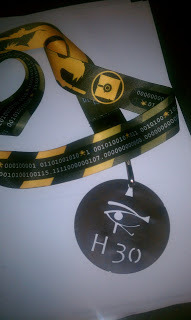 The lanyard contains a series of binary, separated by colons (:), double colons (::), and Defcon logos (smiley-face and crossbones), which we dentoed with an "x". There seemed to be two sets of binary numbers. The second set was separated by periods (.) and had a few non-binary characters which spelled "1o57". Obviously LosT's name. One of the first things I did was make a .txt file with an array of these number, and when separating them by :'s, I noticed they were in 12-bit groups with the x placed in different spots. We tried a number of different crunches on this data, i.e. looking for ASCII characters, translating into hex, etc. Roland thought of trying to order them in order of where the x was, and we found there were two rows with the x in the 8 position and two in the 10. The rest were unique. This turned out to be a distraction.
The lanyard contains a series of binary, separated by colons (:), double colons (::), and Defcon logos (smiley-face and crossbones), which we dentoed with an "x". There seemed to be two sets of binary numbers. The second set was separated by periods (.) and had a few non-binary characters which spelled "1o57". Obviously LosT's name. One of the first things I did was make a .txt file with an array of these number, and when separating them by :'s, I noticed they were in 12-bit groups with the x placed in different spots. We tried a number of different crunches on this data, i.e. looking for ASCII characters, translating into hex, etc. Roland thought of trying to order them in order of where the x was, and we found there were two rows with the x in the 8 position and two in the 10. The rest were unique. This turned out to be a distraction.
We found out from chatting with someone the next day that the binary was a program: PDP-8, which is simply used to square numbers. We took this as a clue that something needed to be squared. But this was also a red herring. In fact, the numbers were simply a data set used to hide another message, but not important in and of themselves: see steganography.
I learned on Saturday that these characters were used against another clue, which we had noticed in the program: ":: HACK UPON XYLEM ::"
I had searched for Xylem on the internet, and found it was a botany term, and spent a few minutes following some false leads there. In reality, this clue worked like this:
HACKUPONXYLEM1110110000x01: L0x11010010100: A0110x10010011: U1111000x00100: N11x1101101000: Cx101010010000: H111x000100001: K
And so on. It spells: LAUNCH KEY NOPMYX. From previous clues, we knew there was one or more secret sites at http://www.defcon.org/1057/??? This was listed in the program. We'd tried http://www.defcon.org/1057/1057, and just http://www.defcon.org/1057, and both of those gave us LosT mocking us, even in invisible black-on-black text, though I did write down everything from both pages (ha). But NOPMYX (case sensitive) goes into the URL, and opened a page with all the clues required for the Z-Agent part of the puzzle. More on that in a second.
Meanwhile, I researched Eye of Horus math. Each part of the eye is a fraction, and I tried to apply that knowledge in all kinds of ways, but was only met with frustration.
There was some kind of Eye of Horus puzzle on the pages of the book, and we both beat that one to death but never figured it out. Some of the eyes had red coloring in the inside (1/2), and some had red on the eyebrow (1/8). Some had dots over the eye, one through five, and each of these was unrepeated. These were only on even-page-numbers, but not every one. They appeared next to Chinese (or Kanji) numbers 1-4. Here are some examples:
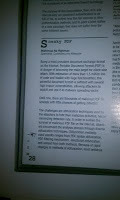

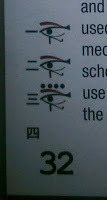
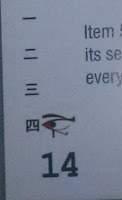
LosT tweets on Sunday clearly indicated there was some way to decode that, possibly in the context of the One Time Pad (more in a bit), but we never did solve this. Some of the theories we tried:
1. The positions of the eye matched the Chinese characters, either in decimal 1-4, or as a squaring function starting at 1 (1,2,4,8), starting at 2 (2,4,8,16), or starting at 1/2 (1/2, 1/4, 1/8, 1/16). On pages with multiple eyes, we added the numbers, and tried various functions with the dots (multiplying, repeating that digit, etc.) On the Speakers pages (pics in a moment), where the talk title started with a HUGE CAPITAL LETTER (yeah, I noticed that first thing), we tried various processes to find letter positions, but nothing helped. The according to LosT's tweet, about decoding the numbers against the eyes, we tried all of the above also against the page number itself -- subtracting, adding, halfing, quartering, and so on. We ran a lot of those against a number that later showed up on the "candy" website. More later.
In a nutshell, we never figured out what the eye code was all about. (Badge numbers didn't seem to correlate here either.)
Where to next. Here are some clues from the program I tried to pay attention to:
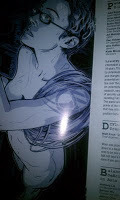
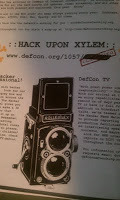
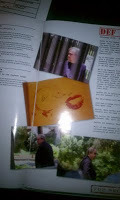
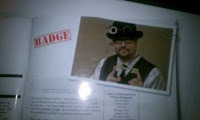
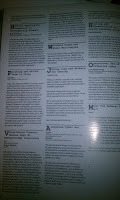
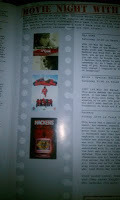
Not sure what was up with the Rollieflex, an old-timy camera, but the number700005 seemed important, since they're part of 1057. I also never figured out what was going on there on page 33 (the tattoo points there). I did notice (before realizing it was page 33) that those tears in the film strip look a little like keyholes.... So I lined up the badge keyhole to all of them and nothing interesting fell out. ARGH! I also lined up the key to this:

And there, some cool things appeared through the gaps, like "another puzzle" and "used to unlock" which ought to have meant something, but what? Coincidence? Nothing else I aligned the badge with in the program gave me anything either.
Other clues pointed back again to that damn film strip, especially the the last "keyhole" on the bottom, but nothing loosened up there.
The most exciting of the above clues was the one thing we actually did that everyone else struggled with. On Thursday, Roland and I both noticed it, and said, "That looks like shorthand!" Both of us have parents who once knew shorthand. But with them far away, we struck out to transcribe it ourselves. It was really frustrating, because shorthand is designed to squish as much info in as small a space as possible. This made it hard to look up in reference guides, because a lot of the strokes are almost identical, defined by things like length and direction the pen was going when the curve is made. But after long hours with Gregg's Shorthand Dictionary, Roland found the very images which had been photoshopped into the program. By Friday, we knew the shorthand spelled: The password is Little Sister.
Very exciting, but not a lot of good when we didn't know what the password went to.
From talking to a few people in the hall and talking to LosT, I'm pretty sure we were one of the first people to figure this one out. A tweet the next day, giving this hint: If you can read the "kiss"- ask an older person or fans of the Mighty Boosh- I'm old greggg! indicated some people might have struggled with even knowing what shorthand is.
So we're pretty proud of that one. Our best achievement unlocked in this game.
We googled "The password is little sister" and it was something of a Googlewhack. There was only one link for this. Easter egg, or clue for next year? It didn't seem to contain anything useful, just a chapter from a Harry Potter fanfic, but given the title, I know it means something: Scatter My Ashes Where They Won't Be Found. (The clue "found" was oft-repeated.)
We also found all the stuff on the CD. Actually, it was on the website: http://www.defcon.org/1057/badge but the link was from the CD, so I shall refer to it thusly from here on.
On the CD were a large number of clues, which we mostly ignored because we kept forgetting about them. They were in a .zip file, and I was mostly on my phone, so it was inconvenient to return to the MacBook and netbook and so on.
But there was a .pdf copy of the crypto-wheel for convenient reference. This wheel was also printed on a massive decal in the main Rotunda of the con. Truly awesome. Here's a pic of the wheel for reference:
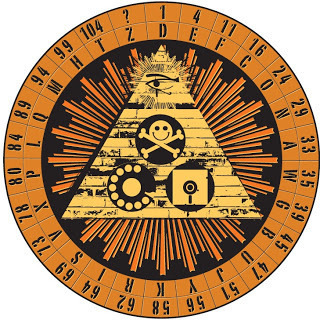
This wheel involved a number of puzzles, the easiest of which was the message encrypted in the numbers printed at the bottom of the large hall signs for the con.
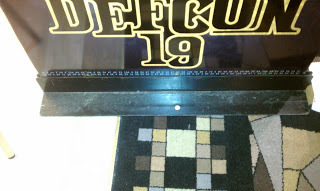 As far as I could tell, the numbers were the same on every sign, which was sort of frustrating, given the incomplete feel of the message. Here it is, letter for letter, with no typos. I've used a slash (/) to indicate probable word separations:
As far as I could tell, the numbers were the same on every sign, which was sort of frustrating, given the incomplete feel of the message. Here it is, letter for letter, with no typos. I've used a slash (/) to indicate probable word separations:
WE/OENETRATE/YOU/RATE/YOUR/SECURITY/LEVELS/LOOK/WITHIN/YOURSELF/WHERE/THE/EYE/LACKS/MESSAGE/THERE/HOBOES/THUD/OF/HORROR
I believe the "O" should be a "P", so it would say "We penetrate you", however this was most likely not a mistake. I have a theory on this which I will discuss later. I focused a lot on looking for a message where the "eye lacks a message". A number of other clues had a similar vibe. This made me also focus again on page 33: Two of those "keyholes" aligned with words in the center of the eye of the badge, but the third one pointed at a blank spot. But none of the other gaps revealed anything.
HOBOES THUD OF HORROR is an anagram for "Brotherhood of Horus". Brotherhood has 11 characters, which matches a number that came up later (on the "Candy" page), but using it as an OTP key didn't work.
Ok, so the Z-Agents. We didn't go through this process ourselves; we only found out about it afterward. Above, the binary puzzle led to http://www.defcon.org/1057/NOPMYX. That page instructs you to find the Z agents (a handful of people with "Z" badges) and include the passphrase from earlier (The password is little sister) on an Ace of Spades card. They would give you a security question, which you would answer with "Every day is Halloween", and they would reply "Damn right", and they'd give you the next clue. I'd love to include some of the specific text, but the Defcon website is down today. (Did they get hacked? lulz.)
We didn't jump through those hoops, because we were told the next clue was "Candy". Which led to http://www.defcon.org/1057/candy. On this page there was a striking image of the Sheep of the Damned, which also appeared on the CD. I still don't know what this image had anything to do with it (we briefly checked its metadata for anything interesting, too) but here is the text from the page:
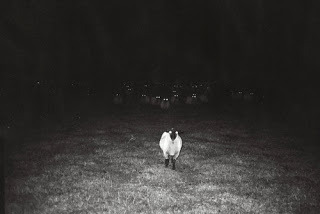
Jammie Dodger is probably another Easter Egg. A Jammie Dodger was used as a self-destruct button on the TARDIS in a recent Doctor Who episode (which I have not yet seen), and was used less-interestingly in a number of other Doctor Who episodes.
We did a view source and noticed the extra spaces. Those did not appear on the page itself. That threw us off: We knew we were looking for a One Time Pad (OTP), but weren't sure if it would have 11 characters or 13 (the spaces indicating to skip those characters or bring them over directly). We spent lots of time looking for and finding strings of characters and numbers of these lengths, including doing lots of math and other funny business to various things, but to no avail. We knew from a tweet that it had something to do with the program, specifically the speaker/talks pages with the giant letters, but didn't know which letters to take as the OTP, and spent a majority of our time trying to wring the secrets from the eyes at the bottom of pages.
Turns out the answer to that was much more simple. By that time we were spying on talking to the group in the chill out room, and someone told us it's simply the first 11 large letters on the talk descriptions in the program. No advanced maths required.
The contest had already been won by then, but we kept plugging away at it. We found the numbers translated to E L O S T B O Y N E T. Drop an @ and a . into the spaces hidden in the source, and we have an email address. I emailed the passphrase, and exactly one hour later, received this reply:
Now, by this time, we knew the final answer was 108 (obviously a Lost TV show Easter Egg) and something else emailed to eban@1o57.org. We had heard they got 108 by adding 48 + 60, and they got those two things from the badge somehow. Something to do with Log12, and the notches on the badges, and looking at the front and back of the badge (sun/moon hints) and I'm not that far along in math so ??? We were trying to reverse engineer the answer, and really wanted to know how they got to it. But as we worked on it, it became apparent there was more than one way to get there. We were on to something that had nothing to do with Log12, but couldn't quite make it work. Partly because I hadn't gotten all the badge numbers and notch positions recorded. This was Sunday evening by this time, so...
But we did notice that if we used the crypto-wheel, and took badge notches and lined them up, and then reversed the badge, and took both of those numbers that the notch pointed to, and added them, we got numbers that correlated with letters in ASCII. We also tried subtracting the badge number, and also got letters.
Here's an example. I have badge number 30, and the notch is in the "2 o'clock" position. That points to 16 on the crypto-wheel. If I flip the badge (sun/moon clues), it points to 99. Add them, it's 115, which is "s" in ASCII. If I subtract 30, I get 85, which is "U" in ASCII. Any badge with a 5 o'clock or 7 o'clock notch will give the number 116 which is "t", and when we subtracted some of those numbers, those all gave nice neat ASCII letters, too. It was very non-arbitrary, so we know it meant something, but that's as far as we got. Now that my mind is fresh and I have a proper desktop computer, and all these details organized, I'm thinking of how easy it would be to go further, but things were much different Sunday at 6pm in the hall with a laptop. :)
I had another theory, related to the clue about the compromised H (human). As near as I could tell, the only badge number without a notch was "3". I remembered something from the day before (a clue I haven't talked about here yet):
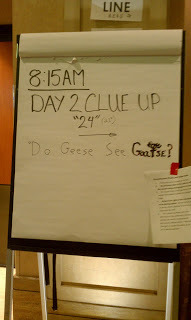
(There were two goatse clues, the other was a QR taped to the rotunda crypto-wheel, but those were undoubtedly one of the many people messing with us). On the same day, a footprint appeared in tape on the "24" position of the wheel in the rotunda, at 23 degrees. I searched the area it pointed to a while, and found that someone was holding the clue I should have found: A coin with "33" printed on it, and a sketch of Anubis?
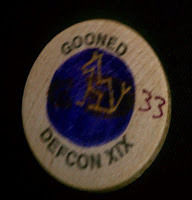
All of the coin stuff aside (that is a WHOLE other story!), everything is pointing to that position on the wheel. Not only that, but remember the message before, decrypted from the crypto-wheel, where the O should have been a P? That was the "3rd" character in, and a "24" on the wheel. If agent "3" was "compromised", they might have sent us the wrong character.
What we really should have done day one was pay for a print out of the wheel. I suspected at some point we'd have to rotate this wheel, especially when the Z was a ? What I really wanted to do was rotate the Z to the "24" position, and start trying to decode all kinds of things using this. But without a paper copy and a pair of scissors, this was extremely difficult. We had to manually count backwards five spaces any time we wanted to check something, which was a real pain. So we didn't get very far down this track either, but I know it means something, and probably would have led us to the same answer those other guys got with the Log12 nonsense.
There were a number of other clues we never used. Most we didn't even spend much time on, and a few of them I kept in the back of my mind. Something kept niggling me.. that "where the eye lacks message". On Sunday, the rotunda wheel got a few additions. Most had been kicked off by foot-traffic by the time we got there (someone told us about it, and I saw the tape). The Eye of Horus had a sicker of the "33" tattoo design from the program, and this:
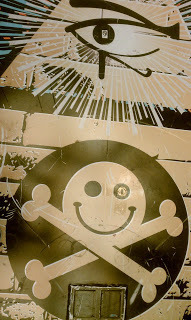
It's just an "o" with some lines on the side, kind of like an eye. The left eye "lacks message". There were also a lot of tweets coming from @1o57 about suns and moons being the same thing (I will post all of those in a bit). So I looked up more Egyptian mythology, and learned that Horus contains both the sun and the moon (because he is the sky). He and Set got into a fight, and Horus lost is left eye, which is the moon, and that's why the moon is darker than the sun. And here we have a left eye with nothing in it.
This one drove me crazy, partly because Roland thought it didn't mean anything when I was so sure it did, and partly because it was important precisely because there was nothing there. I was told when there was nothing there, that's where.. something would happen, but I didn't even have that part of the message ("Where the eye lacks message there..." and it cuts off). There what? I guess I'll never know.
The other rotunda had its own decal. At the cardinal points there was a schematic-looking thing that I learned was to a logic gate. At the inputs of each, there were Chinese characters. Most were numbers, but a few were not. Here's a picture of one:

And a close-up:
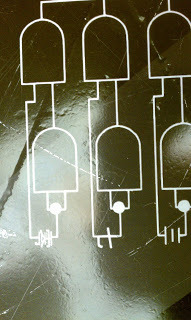
We never got very far on that, though I wanted to do some truth tables, and I noticed there were four sets of three-digit binary groups on the lanyard (010, 111, 011, 100). LosT tweeted that we shouldn't worry about the logic functions but rather the mathematical functions these imply, but forget that! :) Someone else mentioned this puzzle had something to do with narcissistic numbers.
P.S. One thing I learned through all this is that Wikipedia sucks at math articles. They all assume you have mid-college-level math already, and don't do a good job of explaining how things work in a clear way to someone who stopped at pre-calc 20 years ago.
Before I do a raw data dump of all the other clues we noticed but didn't do anything with, here are all the Easter Eggs detected:
108 is a recurrring number from the awesome TV show Lost.
Jammie Dodgers are used in a number of Doctor Who episodes, including as a self-destruct button.
The numbers 1057 (Lost in l33tspeak) where everywhere, including in the Eyes of Horus on the pages. (More on that in a sec.)
Scatter My Ashes Where They Can't Be Found fanfic. I wondered if this had anything to do with a tweet made about something Dan Kaminsky said, "Harry Potter, properly understood is a story about the epic consequences of losing one's password". Or I could just be catching acquired schizophrenia from doing these damn puzzles. :)
When I did some Egyptian fraction math on the eyes in the program, I got a bunch of nifty but apparently-useless fractions. I'll be including pics from my notebook, so you can look at them there, but the important thing to note: The numerators were 1, 5, and 7. 1057 again. Accidental? I doubt it.
Photos of things we found laying around in the Rotundra:
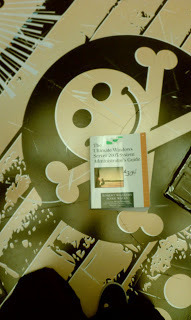 And the coins:
And the coins:
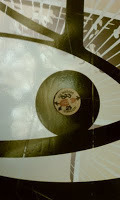
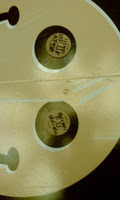
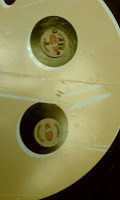
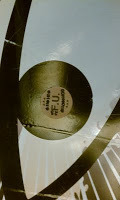
There are actually three coins above, but I photographed both sides. On the coin with the arrows, they point to the edge, where some kind of code was drawn. It looked something like Morse code, but with some /'s and a < and some dark blocks as well. I scribbled these down in my notebook, but am not confident in my ability to capture it well. I dismissed this info, because Lost was standing there, and he told us the coins were just the goons fucking with us. I didn't recognize him as being Lost, and tried to argue with him, and it was all embarrassing and all that, but when I found the "Anubis" coin the next day, I knew that he was fucking with us more than the goons.
There were two black lines taped at positions "47 - U" and "4 - E". I don't know when these appeared, but I noticed on Sunday.

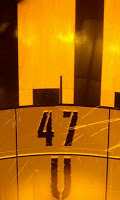
We found the forum entries, and I puzzled over those looking for meaning. Found the "stop" error.
There is a QR code in the video, but I ran into supafraud Saturday night, and asked him. He assured me it contained no clues, just a website and video of him messing around to be funny.
From the talk, I took a few notes. I focused mostly on LosT's quote from Amazing Grace: "I once was lost but now am found, was blind but now I see". I was hoping to get to replace a 1057 or Lost with found or some equivalent, but that opportunity never appeared.
And all of @1o57's clueful tweets: (speaking of which, http://ten-five-seven.org/ was 404ed the whole weekend, and still today.)
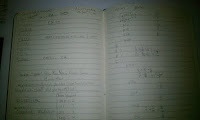
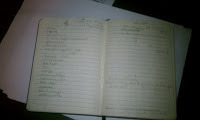

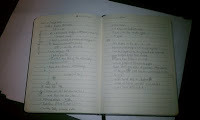
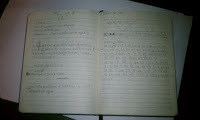


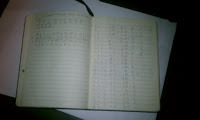
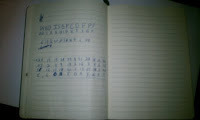
This marks the end of my data-dump. Maybe it will come in handy next year, or help other people who were working on the contest. :) I really look forward to working on the next one. Thanks again, LosT!
That being said, I stole got a few solutions from other people who were weak and capable of being social engineered willing to share their findings.
In the center of the badge was an Eye of Horus. At the top of the badge was a keyhole. I was pretty sure it matched a key symbol someplace which would reveal something in the eye or other parts of the cut-out.
 The lanyard contains a series of binary, separated by colons (:), double colons (::), and Defcon logos (smiley-face and crossbones), which we dentoed with an "x". There seemed to be two sets of binary numbers. The second set was separated by periods (.) and had a few non-binary characters which spelled "1o57". Obviously LosT's name. One of the first things I did was make a .txt file with an array of these number, and when separating them by :'s, I noticed they were in 12-bit groups with the x placed in different spots. We tried a number of different crunches on this data, i.e. looking for ASCII characters, translating into hex, etc. Roland thought of trying to order them in order of where the x was, and we found there were two rows with the x in the 8 position and two in the 10. The rest were unique. This turned out to be a distraction.
The lanyard contains a series of binary, separated by colons (:), double colons (::), and Defcon logos (smiley-face and crossbones), which we dentoed with an "x". There seemed to be two sets of binary numbers. The second set was separated by periods (.) and had a few non-binary characters which spelled "1o57". Obviously LosT's name. One of the first things I did was make a .txt file with an array of these number, and when separating them by :'s, I noticed they were in 12-bit groups with the x placed in different spots. We tried a number of different crunches on this data, i.e. looking for ASCII characters, translating into hex, etc. Roland thought of trying to order them in order of where the x was, and we found there were two rows with the x in the 8 position and two in the 10. The rest were unique. This turned out to be a distraction.We found out from chatting with someone the next day that the binary was a program: PDP-8, which is simply used to square numbers. We took this as a clue that something needed to be squared. But this was also a red herring. In fact, the numbers were simply a data set used to hide another message, but not important in and of themselves: see steganography.
I learned on Saturday that these characters were used against another clue, which we had noticed in the program: ":: HACK UPON XYLEM ::"
I had searched for Xylem on the internet, and found it was a botany term, and spent a few minutes following some false leads there. In reality, this clue worked like this:
HACKUPONXYLEM1110110000x01: L0x11010010100: A0110x10010011: U1111000x00100: N11x1101101000: Cx101010010000: H111x000100001: K
And so on. It spells: LAUNCH KEY NOPMYX. From previous clues, we knew there was one or more secret sites at http://www.defcon.org/1057/??? This was listed in the program. We'd tried http://www.defcon.org/1057/1057, and just http://www.defcon.org/1057, and both of those gave us LosT mocking us, even in invisible black-on-black text, though I did write down everything from both pages (ha). But NOPMYX (case sensitive) goes into the URL, and opened a page with all the clues required for the Z-Agent part of the puzzle. More on that in a second.
Meanwhile, I researched Eye of Horus math. Each part of the eye is a fraction, and I tried to apply that knowledge in all kinds of ways, but was only met with frustration.
There was some kind of Eye of Horus puzzle on the pages of the book, and we both beat that one to death but never figured it out. Some of the eyes had red coloring in the inside (1/2), and some had red on the eyebrow (1/8). Some had dots over the eye, one through five, and each of these was unrepeated. These were only on even-page-numbers, but not every one. They appeared next to Chinese (or Kanji) numbers 1-4. Here are some examples:




LosT tweets on Sunday clearly indicated there was some way to decode that, possibly in the context of the One Time Pad (more in a bit), but we never did solve this. Some of the theories we tried:
1. The positions of the eye matched the Chinese characters, either in decimal 1-4, or as a squaring function starting at 1 (1,2,4,8), starting at 2 (2,4,8,16), or starting at 1/2 (1/2, 1/4, 1/8, 1/16). On pages with multiple eyes, we added the numbers, and tried various functions with the dots (multiplying, repeating that digit, etc.) On the Speakers pages (pics in a moment), where the talk title started with a HUGE CAPITAL LETTER (yeah, I noticed that first thing), we tried various processes to find letter positions, but nothing helped. The according to LosT's tweet, about decoding the numbers against the eyes, we tried all of the above also against the page number itself -- subtracting, adding, halfing, quartering, and so on. We ran a lot of those against a number that later showed up on the "candy" website. More later.
In a nutshell, we never figured out what the eye code was all about. (Badge numbers didn't seem to correlate here either.)
Where to next. Here are some clues from the program I tried to pay attention to:






Not sure what was up with the Rollieflex, an old-timy camera, but the number700005 seemed important, since they're part of 1057. I also never figured out what was going on there on page 33 (the tattoo points there). I did notice (before realizing it was page 33) that those tears in the film strip look a little like keyholes.... So I lined up the badge keyhole to all of them and nothing interesting fell out. ARGH! I also lined up the key to this:

And there, some cool things appeared through the gaps, like "another puzzle" and "used to unlock" which ought to have meant something, but what? Coincidence? Nothing else I aligned the badge with in the program gave me anything either.
Other clues pointed back again to that damn film strip, especially the the last "keyhole" on the bottom, but nothing loosened up there.
The most exciting of the above clues was the one thing we actually did that everyone else struggled with. On Thursday, Roland and I both noticed it, and said, "That looks like shorthand!" Both of us have parents who once knew shorthand. But with them far away, we struck out to transcribe it ourselves. It was really frustrating, because shorthand is designed to squish as much info in as small a space as possible. This made it hard to look up in reference guides, because a lot of the strokes are almost identical, defined by things like length and direction the pen was going when the curve is made. But after long hours with Gregg's Shorthand Dictionary, Roland found the very images which had been photoshopped into the program. By Friday, we knew the shorthand spelled: The password is Little Sister.
Very exciting, but not a lot of good when we didn't know what the password went to.
From talking to a few people in the hall and talking to LosT, I'm pretty sure we were one of the first people to figure this one out. A tweet the next day, giving this hint: If you can read the "kiss"- ask an older person or fans of the Mighty Boosh- I'm old greggg! indicated some people might have struggled with even knowing what shorthand is.
So we're pretty proud of that one. Our best achievement unlocked in this game.
We googled "The password is little sister" and it was something of a Googlewhack. There was only one link for this. Easter egg, or clue for next year? It didn't seem to contain anything useful, just a chapter from a Harry Potter fanfic, but given the title, I know it means something: Scatter My Ashes Where They Won't Be Found. (The clue "found" was oft-repeated.)
We also found all the stuff on the CD. Actually, it was on the website: http://www.defcon.org/1057/badge but the link was from the CD, so I shall refer to it thusly from here on.
On the CD were a large number of clues, which we mostly ignored because we kept forgetting about them. They were in a .zip file, and I was mostly on my phone, so it was inconvenient to return to the MacBook and netbook and so on.
But there was a .pdf copy of the crypto-wheel for convenient reference. This wheel was also printed on a massive decal in the main Rotunda of the con. Truly awesome. Here's a pic of the wheel for reference:

This wheel involved a number of puzzles, the easiest of which was the message encrypted in the numbers printed at the bottom of the large hall signs for the con.
 As far as I could tell, the numbers were the same on every sign, which was sort of frustrating, given the incomplete feel of the message. Here it is, letter for letter, with no typos. I've used a slash (/) to indicate probable word separations:
As far as I could tell, the numbers were the same on every sign, which was sort of frustrating, given the incomplete feel of the message. Here it is, letter for letter, with no typos. I've used a slash (/) to indicate probable word separations:WE/OENETRATE/YOU/RATE/YOUR/SECURITY/LEVELS/LOOK/WITHIN/YOURSELF/WHERE/THE/EYE/LACKS/MESSAGE/THERE/HOBOES/THUD/OF/HORROR
I believe the "O" should be a "P", so it would say "We penetrate you", however this was most likely not a mistake. I have a theory on this which I will discuss later. I focused a lot on looking for a message where the "eye lacks a message". A number of other clues had a similar vibe. This made me also focus again on page 33: Two of those "keyholes" aligned with words in the center of the eye of the badge, but the third one pointed at a blank spot. But none of the other gaps revealed anything.
HOBOES THUD OF HORROR is an anagram for "Brotherhood of Horus". Brotherhood has 11 characters, which matches a number that came up later (on the "Candy" page), but using it as an OTP key didn't work.
Ok, so the Z-Agents. We didn't go through this process ourselves; we only found out about it afterward. Above, the binary puzzle led to http://www.defcon.org/1057/NOPMYX. That page instructs you to find the Z agents (a handful of people with "Z" badges) and include the passphrase from earlier (The password is little sister) on an Ace of Spades card. They would give you a security question, which you would answer with "Every day is Halloween", and they would reply "Damn right", and they'd give you the next clue. I'd love to include some of the specific text, but the Defcon website is down today. (Did they get hacked? lulz.)
We didn't jump through those hoops, because we were told the next clue was "Candy". Which led to http://www.defcon.org/1057/candy. On this page there was a striking image of the Sheep of the Damned, which also appeared on the CD. I still don't know what this image had anything to do with it (we briefly checked its metadata for anything interesting, too) but here is the text from the page:
You have found us. Do not trust the SLEEPER AGENTS you may have discovered. Send the phrase: The Jamie Dodger has been eaten to:28 14 19 28 39 4 31 28 18 11 36
You may be wishing I would speak to you, or illuminate where you may find the key. It's in that place where I put that thing that time.
Wait for a return from the postman.

Jammie Dodger is probably another Easter Egg. A Jammie Dodger was used as a self-destruct button on the TARDIS in a recent Doctor Who episode (which I have not yet seen), and was used less-interestingly in a number of other Doctor Who episodes.
We did a view source and noticed the extra spaces. Those did not appear on the page itself. That threw us off: We knew we were looking for a One Time Pad (OTP), but weren't sure if it would have 11 characters or 13 (the spaces indicating to skip those characters or bring them over directly). We spent lots of time looking for and finding strings of characters and numbers of these lengths, including doing lots of math and other funny business to various things, but to no avail. We knew from a tweet that it had something to do with the program, specifically the speaker/talks pages with the giant letters, but didn't know which letters to take as the OTP, and spent a majority of our time trying to wring the secrets from the eyes at the bottom of pages.
Turns out the answer to that was much more simple. By that time we were spying on talking to the group in the chill out room, and someone told us it's simply the first 11 large letters on the talk descriptions in the program. No advanced maths required.
The contest had already been won by then, but we kept plugging away at it. We found the numbers translated to E L O S T B O Y N E T. Drop an @ and a . into the spaces hidden in the source, and we have an email address. I emailed the passphrase, and exactly one hour later, received this reply:
We have verified that agents have compromised our communications channel.
You need to identify the compromised H, and replace with the Z.
We have verified that there is only one H value that has been compromised.
You may use the SUN/MOON to verify, you do remember how to calculate those, correct?
When you identify the compromised H, analyze and report. The message stream will identify for you a name.
Report to the identity here:
_____________@%LosT 0x2E Organization
Within your message confirm the compromised H, as well as the sum of the moons and stars.
Sent via phone. Please excuse typos.
Now, by this time, we knew the final answer was 108 (obviously a Lost TV show Easter Egg) and something else emailed to eban@1o57.org. We had heard they got 108 by adding 48 + 60, and they got those two things from the badge somehow. Something to do with Log12, and the notches on the badges, and looking at the front and back of the badge (sun/moon hints) and I'm not that far along in math so ??? We were trying to reverse engineer the answer, and really wanted to know how they got to it. But as we worked on it, it became apparent there was more than one way to get there. We were on to something that had nothing to do with Log12, but couldn't quite make it work. Partly because I hadn't gotten all the badge numbers and notch positions recorded. This was Sunday evening by this time, so...
But we did notice that if we used the crypto-wheel, and took badge notches and lined them up, and then reversed the badge, and took both of those numbers that the notch pointed to, and added them, we got numbers that correlated with letters in ASCII. We also tried subtracting the badge number, and also got letters.
Here's an example. I have badge number 30, and the notch is in the "2 o'clock" position. That points to 16 on the crypto-wheel. If I flip the badge (sun/moon clues), it points to 99. Add them, it's 115, which is "s" in ASCII. If I subtract 30, I get 85, which is "U" in ASCII. Any badge with a 5 o'clock or 7 o'clock notch will give the number 116 which is "t", and when we subtracted some of those numbers, those all gave nice neat ASCII letters, too. It was very non-arbitrary, so we know it meant something, but that's as far as we got. Now that my mind is fresh and I have a proper desktop computer, and all these details organized, I'm thinking of how easy it would be to go further, but things were much different Sunday at 6pm in the hall with a laptop. :)
I had another theory, related to the clue about the compromised H (human). As near as I could tell, the only badge number without a notch was "3". I remembered something from the day before (a clue I haven't talked about here yet):

(There were two goatse clues, the other was a QR taped to the rotunda crypto-wheel, but those were undoubtedly one of the many people messing with us). On the same day, a footprint appeared in tape on the "24" position of the wheel in the rotunda, at 23 degrees. I searched the area it pointed to a while, and found that someone was holding the clue I should have found: A coin with "33" printed on it, and a sketch of Anubis?

All of the coin stuff aside (that is a WHOLE other story!), everything is pointing to that position on the wheel. Not only that, but remember the message before, decrypted from the crypto-wheel, where the O should have been a P? That was the "3rd" character in, and a "24" on the wheel. If agent "3" was "compromised", they might have sent us the wrong character.
What we really should have done day one was pay for a print out of the wheel. I suspected at some point we'd have to rotate this wheel, especially when the Z was a ? What I really wanted to do was rotate the Z to the "24" position, and start trying to decode all kinds of things using this. But without a paper copy and a pair of scissors, this was extremely difficult. We had to manually count backwards five spaces any time we wanted to check something, which was a real pain. So we didn't get very far down this track either, but I know it means something, and probably would have led us to the same answer those other guys got with the Log12 nonsense.
There were a number of other clues we never used. Most we didn't even spend much time on, and a few of them I kept in the back of my mind. Something kept niggling me.. that "where the eye lacks message". On Sunday, the rotunda wheel got a few additions. Most had been kicked off by foot-traffic by the time we got there (someone told us about it, and I saw the tape). The Eye of Horus had a sicker of the "33" tattoo design from the program, and this:

It's just an "o" with some lines on the side, kind of like an eye. The left eye "lacks message". There were also a lot of tweets coming from @1o57 about suns and moons being the same thing (I will post all of those in a bit). So I looked up more Egyptian mythology, and learned that Horus contains both the sun and the moon (because he is the sky). He and Set got into a fight, and Horus lost is left eye, which is the moon, and that's why the moon is darker than the sun. And here we have a left eye with nothing in it.
This one drove me crazy, partly because Roland thought it didn't mean anything when I was so sure it did, and partly because it was important precisely because there was nothing there. I was told when there was nothing there, that's where.. something would happen, but I didn't even have that part of the message ("Where the eye lacks message there..." and it cuts off). There what? I guess I'll never know.
The other rotunda had its own decal. At the cardinal points there was a schematic-looking thing that I learned was to a logic gate. At the inputs of each, there were Chinese characters. Most were numbers, but a few were not. Here's a picture of one:

And a close-up:

We never got very far on that, though I wanted to do some truth tables, and I noticed there were four sets of three-digit binary groups on the lanyard (010, 111, 011, 100). LosT tweeted that we shouldn't worry about the logic functions but rather the mathematical functions these imply, but forget that! :) Someone else mentioned this puzzle had something to do with narcissistic numbers.
P.S. One thing I learned through all this is that Wikipedia sucks at math articles. They all assume you have mid-college-level math already, and don't do a good job of explaining how things work in a clear way to someone who stopped at pre-calc 20 years ago.
Before I do a raw data dump of all the other clues we noticed but didn't do anything with, here are all the Easter Eggs detected:
108 is a recurrring number from the awesome TV show Lost.
Jammie Dodgers are used in a number of Doctor Who episodes, including as a self-destruct button.
The numbers 1057 (Lost in l33tspeak) where everywhere, including in the Eyes of Horus on the pages. (More on that in a sec.)
Scatter My Ashes Where They Can't Be Found fanfic. I wondered if this had anything to do with a tweet made about something Dan Kaminsky said, "Harry Potter, properly understood is a story about the epic consequences of losing one's password". Or I could just be catching acquired schizophrenia from doing these damn puzzles. :)
When I did some Egyptian fraction math on the eyes in the program, I got a bunch of nifty but apparently-useless fractions. I'll be including pics from my notebook, so you can look at them there, but the important thing to note: The numerators were 1, 5, and 7. 1057 again. Accidental? I doubt it.
Photos of things we found laying around in the Rotundra:
 And the coins:
And the coins:



There are actually three coins above, but I photographed both sides. On the coin with the arrows, they point to the edge, where some kind of code was drawn. It looked something like Morse code, but with some /'s and a < and some dark blocks as well. I scribbled these down in my notebook, but am not confident in my ability to capture it well. I dismissed this info, because Lost was standing there, and he told us the coins were just the goons fucking with us. I didn't recognize him as being Lost, and tried to argue with him, and it was all embarrassing and all that, but when I found the "Anubis" coin the next day, I knew that he was fucking with us more than the goons.
There were two black lines taped at positions "47 - U" and "4 - E". I don't know when these appeared, but I noticed on Sunday.


We found the forum entries, and I puzzled over those looking for meaning. Found the "stop" error.
There is a QR code in the video, but I ran into supafraud Saturday night, and asked him. He assured me it contained no clues, just a website and video of him messing around to be funny.
From the talk, I took a few notes. I focused mostly on LosT's quote from Amazing Grace: "I once was lost but now am found, was blind but now I see". I was hoping to get to replace a 1057 or Lost with found or some equivalent, but that opportunity never appeared.
And all of @1o57's clueful tweets: (speaking of which, http://ten-five-seven.org/ was 404ed the whole weekend, and still today.)
HINT: Digital logic- consider the mathematical functions implied by the types of gates represented, not simply as taking boolean valuesAnd... all the notes from my notebook. This doesn't include any of the text files or Excel files or most of the things Roland worked on.
HINT: If you can read the "kiss"- ask an older person or fans of the Mighty Boosh- I'm old greggg!HINT: there are LOTS of people creating FAKE clues. Like most of the red shirt goons :) If it's not elegant, it's not me ;)
HINT: there are Z badges floating around the conference.....
Hint : if you have passed a card to z and are stuck- you are now dealing with a OTP. And you have the key
Hint: The eyes on the bottom of the pages are used against the page numbers for decoding...
The otp info you are looking for is in the program
If I SPEAK about the TRACKS that BIG foot left, I might break the LETTEr of the law.
The moon can sometimes appear as bright as the sun, depending on how you look at it.
H3 agents are rogue.
The sun and moon are opposed..kind of
Ra stands in opposition to horus
Every badge has both a sun and a moon
The dial is a sequence. It has a name. So do the badges
The sun can be seen with the naked eye. So can the moon.
Sun is position. Directly. Moon is position , directly. Every h has a sun and a moon









This marks the end of my data-dump. Maybe it will come in handy next year, or help other people who were working on the contest. :) I really look forward to working on the next one. Thanks again, LosT!
Published on August 08, 2011 16:58
Defcon Badge Contest: In General
Of my four years of going to Defcon, I had the most fun this year at Defcon19.
Granted, my first year was pretty fun. There were lots of antics going on, and I went to a lot of talks. And Defcon17, we got an invite to the Facebook party at Studio54 where DualCore and YTCracker were playing. And last year, Defcon18, was kind of a blur.
But none of those years had a badge hacking contest I could actually participate in.
When I heard the badge this year was going to be non-electronic, I scowled. I waxed cynical. I joked to people that they were going to print the badges on hot-pink cardstock. It was hard to imagine any badge being as cool as this, this, or this.
As with every year, there were not enough badges. Here's a quick summary of just how lucky I was to even get one. I got in line at 2:50 on Thursday. I stood in line for an hour and a half, the line stopped 14 people away from the front, waited 30 minutes, got told lots of conflicting information about badge availability and wait-times, waited longer, got to the front of the line, got told more metal badges on there way, but if I registered right then I'd get a badge of shame paper badge non-redeemable for a metal badge later, heard there were badges left at Caesar's Palace (where Blackhat was letting out), left the line, tried to call Roland so he could get me a badge there but my phone battery died, heard that all metal badges were gone for good, Roland arrived from Caesar's, got back in line for two hours, and 25 people away from the front of the line it stopped again, then heard the good news ripple up from the front: A small Fedex package had arrived with a small number of metal badges.
Color me ecstatic and incredibly lucky. Here's a picture of my beautiful badge:
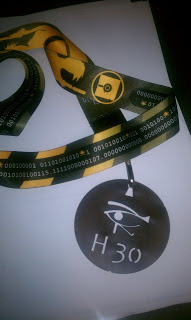 And not only is it stamped on antiqued oxidized titanium, printed on the last supply of .040"sheet-titanium left in the United States, but it is also part of a complex series of puzzles, a conspiracy if you will, that permeated the entire con.
And not only is it stamped on antiqued oxidized titanium, printed on the last supply of .040"sheet-titanium left in the United States, but it is also part of a complex series of puzzles, a conspiracy if you will, that permeated the entire con.
Clues were hidden in the badge itself, in the lanyard (see the binary in the pic?), in the con program, in the T-shirt art, in the badge talk, on twitter, in the signs, in the hallway art. There was even a hired actor, though I never saw him, who would play out scenes to give further clues.
It was a well-designed game. Most of the clues were repeated in various places, so everyone had a chance to find them. I also get the sense clues hidden behind incredibly complex encryption or puzzles could also be found through much more simple means. For example, we heard that one person build some kind of gear machine that eeked the word "candy" from the crypto wheel, but most people got that answer by giving a password to a "Z" agent, and the agent just told them the word. (Not that it was easy to find all the clues that gave you the password or told you about the Z agents, but that was certainly more accessible than whatever crazy math and hardware hacking was required to interrogate the crypto wheel.)
Starting Thursday night, Roland and I became obsessed with finding clues and cracking codes. We stayed up until 2am Thursday night. Every once in a while, one of us would ask the other, "Want to go out tonight, find a party?"... no.
I haven't had this much fun in this kind of way since I was a kid, back when I was the first in my class, every week, to crack the weekly brain-teaser. Or when I'd obsess on a text adventure on my TI 99/4A, trying to solve puzzles for days at a time. These days with whiz-bang video games, and busy schedules, it's hard to find the patience for recreational intellectual heavy-lifting, when we can simply google a solution or even a full walk-through on the internet.
This badge contest made me remember how much fun it can be to work something out. It made me feel smart. For the first time at Defcon, amongst some of the l33test people on earth, I actually felt l33t.
That's not to say we actually solved the puzzle, and we couldn't have gotten as far as we did without stealing other people's solutions talking to people. But it wasn't designed for any one person to beat. LosT designed it to make us all more social. The clues required too broad a skillset and knowledge spectrum, mostly the sort of thing you can't simply google. And the badges themselves were all different, requiring interaction to gather the data.
I must say, we started the contest being secretive, hoarding our knowledge. There's a certain type of elation when you can gloat personally and sometimes publicly that you know something they don't know. But it really would have been much more productive to share, I think. And it would have made us just as happy. Not only that, but if we were going for l33tness and geek status points, we probably would have gotten more if we'd shared from the get-go. Especially given just how light-weight and inexperienced at puzzle-solving that we are (or were....)
We did much better at the early puzzles, and my personal strong-point was noticing clues. I usually didn't have the foggiest what to do with the clues, even though I thought I did... If I had pointed them out early, publicly, I would have earned higher hacker cred. Since I didn't solve the puzzle, the fact that I noticed the 33 tattoo in the program on the first day, doesn't really matter since I still don't know what that damn 33 was for. I know it was important because I saw this clue coming up again over time -- on an added sticker in the rotunda, written on a coin stuck on the wall, etc. i.e. LosT was saying, "Hey you guys keep missing this clue!" ... I had it all along, and someone else could have done something with it.
Not that geek status is the end-goal. It's just part of the fun. Solving the pieces for their own sake was its own kind of elation. But there are multiple ways to display l33tness, and sharing is one of them.
We are definitely planning to do this again next year, and when we do, we plan to collaborate this time. I'm not exactly sure what form that will take. This year, there was an IRC channel, but I wanted to keep my netbook off the Defcon network and didn't want to pay for (pwned) hotel wireless. Next year I may consider bothering with it.
In fact, being without internet+netbook was a huge barrier. My method of problem-solving relies on the gathering of as much information as quickly as possible, then eliminating distractions as quickly as possible. Use of the internet on a larger screen with a keyboard is necessary for that. My Android simply wasn't up to that task. I would also like to develop a more systematic method for storing information and testing theories.
Here are a couple of pictures from my notebook, to illustrate some of my thought processes and the kinds of clues we were collecting:
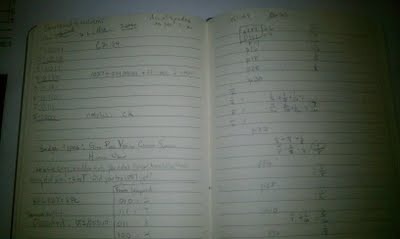
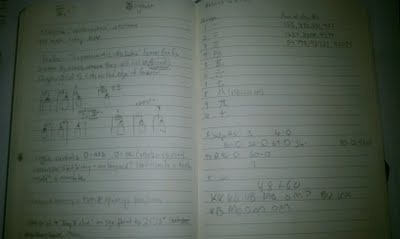
A collaboration group did form, and even though we didn't participate with them, we happened to be present when they won. That was was really cool. On Sunday afternoon, we found the collaborators in the chill-out room and started hovering, listening to them, and trying to figure out how they'd solved this or that, and what they were currently working on. Thirty minutes later, they got the email reply from LosT confirming they'd won. I'm not sure the full solution, but they emailed the number 108 and some other info to eban at 1o57.org, but we had no idea how they found that or what the other info was. Roland and I spent another hour or so trying to reverse engineer from there, and actually got a lot further along, but decided to quit out of sheer exhaustion.
So thanks very much to LosT boY for accomplishing the goals you listed in the badge talk: The badge contest was accessible to all, and you got some of us introverted nerds to interact for a change.
In my next post, I will detail some of the specifics and list the clues we found and puzzles we solved or at least worked on for a long time. Some of the clues from this year were intended to carry over to next year, so if you plan to participate, pay attention!
See you next year!
Granted, my first year was pretty fun. There were lots of antics going on, and I went to a lot of talks. And Defcon17, we got an invite to the Facebook party at Studio54 where DualCore and YTCracker were playing. And last year, Defcon18, was kind of a blur.
But none of those years had a badge hacking contest I could actually participate in.
When I heard the badge this year was going to be non-electronic, I scowled. I waxed cynical. I joked to people that they were going to print the badges on hot-pink cardstock. It was hard to imagine any badge being as cool as this, this, or this.
As with every year, there were not enough badges. Here's a quick summary of just how lucky I was to even get one. I got in line at 2:50 on Thursday. I stood in line for an hour and a half, the line stopped 14 people away from the front, waited 30 minutes, got told lots of conflicting information about badge availability and wait-times, waited longer, got to the front of the line, got told more metal badges on there way, but if I registered right then I'd get a badge of shame paper badge non-redeemable for a metal badge later, heard there were badges left at Caesar's Palace (where Blackhat was letting out), left the line, tried to call Roland so he could get me a badge there but my phone battery died, heard that all metal badges were gone for good, Roland arrived from Caesar's, got back in line for two hours, and 25 people away from the front of the line it stopped again, then heard the good news ripple up from the front: A small Fedex package had arrived with a small number of metal badges.
Color me ecstatic and incredibly lucky. Here's a picture of my beautiful badge:
 And not only is it stamped on antiqued oxidized titanium, printed on the last supply of .040"sheet-titanium left in the United States, but it is also part of a complex series of puzzles, a conspiracy if you will, that permeated the entire con.
And not only is it stamped on antiqued oxidized titanium, printed on the last supply of .040"sheet-titanium left in the United States, but it is also part of a complex series of puzzles, a conspiracy if you will, that permeated the entire con.Clues were hidden in the badge itself, in the lanyard (see the binary in the pic?), in the con program, in the T-shirt art, in the badge talk, on twitter, in the signs, in the hallway art. There was even a hired actor, though I never saw him, who would play out scenes to give further clues.
It was a well-designed game. Most of the clues were repeated in various places, so everyone had a chance to find them. I also get the sense clues hidden behind incredibly complex encryption or puzzles could also be found through much more simple means. For example, we heard that one person build some kind of gear machine that eeked the word "candy" from the crypto wheel, but most people got that answer by giving a password to a "Z" agent, and the agent just told them the word. (Not that it was easy to find all the clues that gave you the password or told you about the Z agents, but that was certainly more accessible than whatever crazy math and hardware hacking was required to interrogate the crypto wheel.)
Starting Thursday night, Roland and I became obsessed with finding clues and cracking codes. We stayed up until 2am Thursday night. Every once in a while, one of us would ask the other, "Want to go out tonight, find a party?"... no.
I haven't had this much fun in this kind of way since I was a kid, back when I was the first in my class, every week, to crack the weekly brain-teaser. Or when I'd obsess on a text adventure on my TI 99/4A, trying to solve puzzles for days at a time. These days with whiz-bang video games, and busy schedules, it's hard to find the patience for recreational intellectual heavy-lifting, when we can simply google a solution or even a full walk-through on the internet.
This badge contest made me remember how much fun it can be to work something out. It made me feel smart. For the first time at Defcon, amongst some of the l33test people on earth, I actually felt l33t.
That's not to say we actually solved the puzzle, and we couldn't have gotten as far as we did without stealing other people's solutions talking to people. But it wasn't designed for any one person to beat. LosT designed it to make us all more social. The clues required too broad a skillset and knowledge spectrum, mostly the sort of thing you can't simply google. And the badges themselves were all different, requiring interaction to gather the data.
I must say, we started the contest being secretive, hoarding our knowledge. There's a certain type of elation when you can gloat personally and sometimes publicly that you know something they don't know. But it really would have been much more productive to share, I think. And it would have made us just as happy. Not only that, but if we were going for l33tness and geek status points, we probably would have gotten more if we'd shared from the get-go. Especially given just how light-weight and inexperienced at puzzle-solving that we are (or were....)
We did much better at the early puzzles, and my personal strong-point was noticing clues. I usually didn't have the foggiest what to do with the clues, even though I thought I did... If I had pointed them out early, publicly, I would have earned higher hacker cred. Since I didn't solve the puzzle, the fact that I noticed the 33 tattoo in the program on the first day, doesn't really matter since I still don't know what that damn 33 was for. I know it was important because I saw this clue coming up again over time -- on an added sticker in the rotunda, written on a coin stuck on the wall, etc. i.e. LosT was saying, "Hey you guys keep missing this clue!" ... I had it all along, and someone else could have done something with it.
Not that geek status is the end-goal. It's just part of the fun. Solving the pieces for their own sake was its own kind of elation. But there are multiple ways to display l33tness, and sharing is one of them.
We are definitely planning to do this again next year, and when we do, we plan to collaborate this time. I'm not exactly sure what form that will take. This year, there was an IRC channel, but I wanted to keep my netbook off the Defcon network and didn't want to pay for (pwned) hotel wireless. Next year I may consider bothering with it.
In fact, being without internet+netbook was a huge barrier. My method of problem-solving relies on the gathering of as much information as quickly as possible, then eliminating distractions as quickly as possible. Use of the internet on a larger screen with a keyboard is necessary for that. My Android simply wasn't up to that task. I would also like to develop a more systematic method for storing information and testing theories.
Here are a couple of pictures from my notebook, to illustrate some of my thought processes and the kinds of clues we were collecting:


A collaboration group did form, and even though we didn't participate with them, we happened to be present when they won. That was was really cool. On Sunday afternoon, we found the collaborators in the chill-out room and started hovering, listening to them, and trying to figure out how they'd solved this or that, and what they were currently working on. Thirty minutes later, they got the email reply from LosT confirming they'd won. I'm not sure the full solution, but they emailed the number 108 and some other info to eban at 1o57.org, but we had no idea how they found that or what the other info was. Roland and I spent another hour or so trying to reverse engineer from there, and actually got a lot further along, but decided to quit out of sheer exhaustion.
So thanks very much to LosT boY for accomplishing the goals you listed in the badge talk: The badge contest was accessible to all, and you got some of us introverted nerds to interact for a change.
In my next post, I will detail some of the specifics and list the clues we found and puzzles we solved or at least worked on for a long time. Some of the clues from this year were intended to carry over to next year, so if you plan to participate, pay attention!
See you next year!
Published on August 08, 2011 12:55
July 25, 2011
Fuzzy-Wuzzy Was A Bear: Killing 'Was' Brings Prose To Life
Every time our writer's group gets a new writer, I give a certain speech: Was is a dead-word. Kill it. It is the low-hanging-fruit of better writing, an alarm that jumps off the page and demands, "Make me more interesting!"
Was is clearly a verb, but doesn't move. It offers no description or action. It notifies us that a thing exists, but tells nothing about how it exists or what it is doing. The nouns and adverbs that follow it will surely describe more, but that is no excuse. Replacing a was is an easy opportunity to make prose more colorful and active - and possibly a chance to trim extra words.
Was (and his sister were) is also a warning that something may be amiss. Many was's indicate that the passive voice was used. (See what I did there?) It can also indicate that the writer was using an extra verb that can simply be cut. (See what I did there again?)
So what do we do with those was's? Some of them are extremely easy to cut if you know the tricks. Some are troublesome -- you know it needs to go, but how? And some are impossible to remove. Moreover, not all was's are bad. Fuzzy Wuzzy really was a bear, and I can't think of any better way to say it. And there are other factors to consider -- like voice, rhythm, and pacing -- and it we don't want to sacrifice those, do we? Sometimes not.
So let's start with the easy was fixes, and move up to the more complex.
Replace with a more active verb.
The soldier was on the hill.
Snore. There he was. On a hill. Boring. I want to know more about that soldier; I want to see him. Here, the was indicates the author is telling, not showing.
The simplest fix: Find another verb.
The soldier stood on the hill.
It's still kind of boring, but maybe the soldier is boring, and he'll be doing something exciting in a moment. Maybe we don't want to distract the reader with what that soldier is doing, because all we need say is that he's there, and the real action is coming up from a different direction. But maybe the soldier is doing something else while he's standing there, and it is I, the author, who is being boring. Here are a few better examples:
The soldier waited on the hill.
The soldier paused on the hill.
The soldier hid on the hill.
The soldier gripped the side of the hill.
The soldier watched from the hill.
The soldier shivered on the hill.
All of these examples give more depth, more information about the emotional state or intentions of the character.
The last one is my favorite. He's still just standing on the hill, but with just one word-change, he is now feeling something and we know
The first two examples required very little work. But the others? I had to make an extra effort to think and visualize, until I came up with some idea of what that guy was actually doing up there. In many cases it is worth the extra effort, because if we can't see it, our readers surely can't.
Replace with the verb that is already there.
Frank was asking about the party.
Was is superfluous here. It adds nothing. Simply cross it out and change the tense of ask: Frank asked about the party.
Very rarely, the was adds a subtle connotation of additional information. For example: I was hoping we could go out tonight. This indicates that maybe it's too late, that some doubt has crept in about the verb, or that the status has changed. Was is then sometimes a substitute for the dreaded had which we also want to reduce, i.e. as an alternative to, I had hoped... In this case, keep the was, or go with the had. They are equals.
Sometimes with this method, we need to change the verb for it to make sense. And that's good, too. See how this sentence transforms:
Pie filling was stuck all over her face.
vs:
Pie filling covered her face.
Passive voice.
Passive voice rarely belongs in fiction prose. It takes a lot of practice to get good at finding passive voice in your prose. Was is an easy warning sign. (Bearing in mind that these are not mutually exclusive: you can write active voice with a was, and can write passive voice without it.)
Much has been written on passive voice, what it is, and why it is bad, so I won't go deeply into it here. In summary, it is a sentence structure where something is acted upon, rather than an actor acting on that thing. The reader never knows who the actor is, only that an action was done.
Here is an example with a was:
The old man was killed in cold blood.
So what? The old man may be murdered, but so is any sense of shock over the crime. We almost have an exciting sentence there, but it sounds a little stilted and stifled. Let's change it to active voice, and watch that was disappear:
Someone had killed the old man in cold blood.
Even with a had in there, this act of murder is now a surprise -- as it should be. We still don't know who the killer is -- that is still a mystery -- but now I feel more interested in finding out who dun it.
The sentence would be better rearranged.
Sometimes the was indicates an awkward or weak sentence. A rearrangement of the ideas, the order in which they are presented, will remove the was and also make it a better-written sentence.
Simple example:
Billy wanted to say something nice, but all that came out was, "You're not very fat."
This is clumsy, and the was lets us know. Not a lot of rearranging here:
Billy wanted to say something nice, but he could only manage, "You're not very fat."
Let's try another one:
Of all the things the witch loved, the wand was her favorite.
This sentence is okay. It loads the concepts of action in the prepositional phrase, and all that's left is to note the wands existence (and then modify that with favorite). There is a certain voice to that, but it's a little awkward.
We could logically rearrange the sentence, putting the concept of the wand first:
The witch loved her wand most, out of all her favorite things.
That method works better the more complex the sentence is. I've seen a lot of unweildy paragraphs smooth right out after rearranging the order of the concepts and dropping the was's.
Or we can keep the logical order, but break it up:
The witch favored a lot of things. But mostly, she loved the wand.
New example:
Walking all the way to Mordor was out of the question.
Try:
No, they couldn't walk all the way to Mordor.
Show, don't tell.
That squirrelly was: it shows you that you may be telling.
I know I said this already. But in my soldier example, I took the easy way out. I simply replaced the verb. But the was may indicate a drastic lack of detail you should fill in. So allow me to elaborate.
She was old.
Holy crap, so much telling! I heard we're not supposed to do that! But if it is true that she really is old, how do we say it? Describe the things that make her old:
She walked with bent back, her hair coarse and gray. Her voice rasped like the last breath of a dying animal. And she smelled like orange juice.
That's better. And not a single was anywhere. The change hurt my word count, but at least it's not boring.
That being said...
Don't kill every was. Sometimes they are stubborn things that are not worth the trouble. Sometimes simplicity is best. Sometimes you are just describing a scene, and don't need your objects doing anything, just lying there being red or dirty or strong or soggy. As with all writing rules, this one is meant to be broken.
But generally, this tip will clarify your prose, give your characters and settings depth, and add pep to your action scenes.
Was is clearly a verb, but doesn't move. It offers no description or action. It notifies us that a thing exists, but tells nothing about how it exists or what it is doing. The nouns and adverbs that follow it will surely describe more, but that is no excuse. Replacing a was is an easy opportunity to make prose more colorful and active - and possibly a chance to trim extra words.
Was (and his sister were) is also a warning that something may be amiss. Many was's indicate that the passive voice was used. (See what I did there?) It can also indicate that the writer was using an extra verb that can simply be cut. (See what I did there again?)
So what do we do with those was's? Some of them are extremely easy to cut if you know the tricks. Some are troublesome -- you know it needs to go, but how? And some are impossible to remove. Moreover, not all was's are bad. Fuzzy Wuzzy really was a bear, and I can't think of any better way to say it. And there are other factors to consider -- like voice, rhythm, and pacing -- and it we don't want to sacrifice those, do we? Sometimes not.
So let's start with the easy was fixes, and move up to the more complex.
Replace with a more active verb.
The soldier was on the hill.
Snore. There he was. On a hill. Boring. I want to know more about that soldier; I want to see him. Here, the was indicates the author is telling, not showing.
The simplest fix: Find another verb.
The soldier stood on the hill.
It's still kind of boring, but maybe the soldier is boring, and he'll be doing something exciting in a moment. Maybe we don't want to distract the reader with what that soldier is doing, because all we need say is that he's there, and the real action is coming up from a different direction. But maybe the soldier is doing something else while he's standing there, and it is I, the author, who is being boring. Here are a few better examples:
The soldier waited on the hill.
The soldier paused on the hill.
The soldier hid on the hill.
The soldier gripped the side of the hill.
The soldier watched from the hill.
The soldier shivered on the hill.
All of these examples give more depth, more information about the emotional state or intentions of the character.
The last one is my favorite. He's still just standing on the hill, but with just one word-change, he is now feeling something and we know
The first two examples required very little work. But the others? I had to make an extra effort to think and visualize, until I came up with some idea of what that guy was actually doing up there. In many cases it is worth the extra effort, because if we can't see it, our readers surely can't.
Replace with the verb that is already there.
Frank was asking about the party.
Was is superfluous here. It adds nothing. Simply cross it out and change the tense of ask: Frank asked about the party.
Very rarely, the was adds a subtle connotation of additional information. For example: I was hoping we could go out tonight. This indicates that maybe it's too late, that some doubt has crept in about the verb, or that the status has changed. Was is then sometimes a substitute for the dreaded had which we also want to reduce, i.e. as an alternative to, I had hoped... In this case, keep the was, or go with the had. They are equals.
Sometimes with this method, we need to change the verb for it to make sense. And that's good, too. See how this sentence transforms:
Pie filling was stuck all over her face.
vs:
Pie filling covered her face.
Passive voice.
Passive voice rarely belongs in fiction prose. It takes a lot of practice to get good at finding passive voice in your prose. Was is an easy warning sign. (Bearing in mind that these are not mutually exclusive: you can write active voice with a was, and can write passive voice without it.)
Much has been written on passive voice, what it is, and why it is bad, so I won't go deeply into it here. In summary, it is a sentence structure where something is acted upon, rather than an actor acting on that thing. The reader never knows who the actor is, only that an action was done.
Here is an example with a was:
The old man was killed in cold blood.
So what? The old man may be murdered, but so is any sense of shock over the crime. We almost have an exciting sentence there, but it sounds a little stilted and stifled. Let's change it to active voice, and watch that was disappear:
Someone had killed the old man in cold blood.
Even with a had in there, this act of murder is now a surprise -- as it should be. We still don't know who the killer is -- that is still a mystery -- but now I feel more interested in finding out who dun it.
The sentence would be better rearranged.
Sometimes the was indicates an awkward or weak sentence. A rearrangement of the ideas, the order in which they are presented, will remove the was and also make it a better-written sentence.
Simple example:
Billy wanted to say something nice, but all that came out was, "You're not very fat."
This is clumsy, and the was lets us know. Not a lot of rearranging here:
Billy wanted to say something nice, but he could only manage, "You're not very fat."
Let's try another one:
Of all the things the witch loved, the wand was her favorite.
This sentence is okay. It loads the concepts of action in the prepositional phrase, and all that's left is to note the wands existence (and then modify that with favorite). There is a certain voice to that, but it's a little awkward.
We could logically rearrange the sentence, putting the concept of the wand first:
The witch loved her wand most, out of all her favorite things.
That method works better the more complex the sentence is. I've seen a lot of unweildy paragraphs smooth right out after rearranging the order of the concepts and dropping the was's.
Or we can keep the logical order, but break it up:
The witch favored a lot of things. But mostly, she loved the wand.
New example:
Walking all the way to Mordor was out of the question.
Try:
No, they couldn't walk all the way to Mordor.
Show, don't tell.
That squirrelly was: it shows you that you may be telling.
I know I said this already. But in my soldier example, I took the easy way out. I simply replaced the verb. But the was may indicate a drastic lack of detail you should fill in. So allow me to elaborate.
She was old.
Holy crap, so much telling! I heard we're not supposed to do that! But if it is true that she really is old, how do we say it? Describe the things that make her old:
She walked with bent back, her hair coarse and gray. Her voice rasped like the last breath of a dying animal. And she smelled like orange juice.
That's better. And not a single was anywhere. The change hurt my word count, but at least it's not boring.
That being said...
Don't kill every was. Sometimes they are stubborn things that are not worth the trouble. Sometimes simplicity is best. Sometimes you are just describing a scene, and don't need your objects doing anything, just lying there being red or dirty or strong or soggy. As with all writing rules, this one is meant to be broken.
But generally, this tip will clarify your prose, give your characters and settings depth, and add pep to your action scenes.
Published on July 25, 2011 14:52
July 13, 2011
Exporting Outlook Express Files to .eml
I know this isn't a tech help blog, but I searched the web for how to do this, and couldn't find it. Turns out it's really easy, so it needs to be recorded.
Problem:
I have an old laptop gathering dust that I want to decommission. I want to save five years of old emails stored in Outlook Express 6. I now exclusively use Gmail, so I want them in a format I can refer to, even decades from now when no one's ever heard of Outlook. The most standard format I've ever run across is .eml, which is not only recognized by a number of email clients, but worst-case it is text-based, so neatly viewable in Notepad.
However, Outlook Express doesn't let you do a mass-export of everything into .eml. When I tried clicking and dragging 4000 messages into a Windows Explorer folder (which works for small groups of messages), it would pop up the message, "Error copying file or folder. Cannot create or replace email: There is already a folder with the same name as the file name you updated. Specify a different name."
Since this method names the .eml files after the subject line, I presume duplicate subject names were giving it fits.
There are third-party, for-pay exporters, but I didn't feel the need to pay for these. Turns out I didn't need 'em.
Solution:
I located the Outlook Express database files, inbox.dbx, etc. To find them, in Outlook Express simply click Tools > Options > Maintenance > Store Folder. Copy and paste that into the address bar of a Windows Explorer window.
Then I copied those files straight over to my desktop computer, where I'm running Windows 7.
Then I went to Microsoft's website and installed the newest version of "Outlook Express", now known as Windows Live Mail. I was careful not to install all the other Windows Live items, because I don't need all that junk.
Once installed, I opened it, and canceled the dialog box which wanted me to setup an email account. Instead, I went to File > Import Messages. I chose Outlook Express 6, and pointed it at the folder containing all the .dbx files.
This went really well. All my old messages were located in Storage Folders > Imported Folders > Inbox and so on.
This is all fine and good if I want to be strapped to Windows Live for forever, and have to go through the same confusion and trouble ten years from now when Windows 9 is out, and they call their mail program "Windows Mail Explorer" or whatever their focus groups come up with. So on to exporting to .eml.
I had been hoping Microsoft would have gotten a clue and made a .eml exporter by now, but no. So I tried what I did before in Outlook Express, only this time, it worked beautifully.
Make a folder on one of your hard drivers or in My Documents where you'd like all these to go. I'd recommend something like OldEmail\Inbox, and so on, to keep your former organization structure.
Then, with both windows in easy view, simply select all messages in Live Mail (CTRL-A), then click and drag them into the folder on your hard drive. Give it some time. It won't look like much is happening, and a simple refresh will show you an empty folder, so just wait a few minutes, then click out of that folder and back in. You should see all your messages.
Just double check it got them all by comparing the total number of messages to the total number of files in the folder. Then you're done!
There are a couple of minor problems with this method. For one, all the message names are named after the email subject line. No sender data, etc. Also the message date is missing, replaced with today's date. (Though some files randomly retained their sent date... not sure why.) For that, I'd recommend retaining the .dbx files, and the .eml files as a backup, and then when you need to look up a message, just use Windows Live. If it's not around in ten years, well at least you have the source files and the raws.
Problem:
I have an old laptop gathering dust that I want to decommission. I want to save five years of old emails stored in Outlook Express 6. I now exclusively use Gmail, so I want them in a format I can refer to, even decades from now when no one's ever heard of Outlook. The most standard format I've ever run across is .eml, which is not only recognized by a number of email clients, but worst-case it is text-based, so neatly viewable in Notepad.
However, Outlook Express doesn't let you do a mass-export of everything into .eml. When I tried clicking and dragging 4000 messages into a Windows Explorer folder (which works for small groups of messages), it would pop up the message, "Error copying file or folder. Cannot create or replace email: There is already a folder with the same name as the file name you updated. Specify a different name."
Since this method names the .eml files after the subject line, I presume duplicate subject names were giving it fits.
There are third-party, for-pay exporters, but I didn't feel the need to pay for these. Turns out I didn't need 'em.
Solution:
I located the Outlook Express database files, inbox.dbx, etc. To find them, in Outlook Express simply click Tools > Options > Maintenance > Store Folder. Copy and paste that into the address bar of a Windows Explorer window.
Then I copied those files straight over to my desktop computer, where I'm running Windows 7.
Then I went to Microsoft's website and installed the newest version of "Outlook Express", now known as Windows Live Mail. I was careful not to install all the other Windows Live items, because I don't need all that junk.
Once installed, I opened it, and canceled the dialog box which wanted me to setup an email account. Instead, I went to File > Import Messages. I chose Outlook Express 6, and pointed it at the folder containing all the .dbx files.
This went really well. All my old messages were located in Storage Folders > Imported Folders > Inbox and so on.
This is all fine and good if I want to be strapped to Windows Live for forever, and have to go through the same confusion and trouble ten years from now when Windows 9 is out, and they call their mail program "Windows Mail Explorer" or whatever their focus groups come up with. So on to exporting to .eml.
I had been hoping Microsoft would have gotten a clue and made a .eml exporter by now, but no. So I tried what I did before in Outlook Express, only this time, it worked beautifully.
Make a folder on one of your hard drivers or in My Documents where you'd like all these to go. I'd recommend something like OldEmail\Inbox, and so on, to keep your former organization structure.
Then, with both windows in easy view, simply select all messages in Live Mail (CTRL-A), then click and drag them into the folder on your hard drive. Give it some time. It won't look like much is happening, and a simple refresh will show you an empty folder, so just wait a few minutes, then click out of that folder and back in. You should see all your messages.
Just double check it got them all by comparing the total number of messages to the total number of files in the folder. Then you're done!
There are a couple of minor problems with this method. For one, all the message names are named after the email subject line. No sender data, etc. Also the message date is missing, replaced with today's date. (Though some files randomly retained their sent date... not sure why.) For that, I'd recommend retaining the .dbx files, and the .eml files as a backup, and then when you need to look up a message, just use Windows Live. If it's not around in ten years, well at least you have the source files and the raws.
Published on July 13, 2011 14:34
Extracting Outlook Express Files to .eml
I know this isn't a tech help blog, but I searched the web for how to do this, and couldn't find it. Turns out it's really easy, so it needs to be recorded.
Problem:
I have an old laptop gathering dust that I want to decommission. I want to save five years of old emails stored in Outlook Express 6. I now exclusively use Gmail, so I want them in a format I can refer to, even decades from now when no one's ever heard of Outlook. The most standard format I've ever run across is .eml, which is not only recognized by a number of email clients, but worst-case it is text-based, so neatly viewable in Notepad.
However, Outlook Express doesn't let you do a mass-export of everything into .eml. When I tried clicking and dragging 4000 messages into a Windows Explorer folder (which works for small groups of messages), it would pop up the message, "Error copying file or folder. Cannot create or replace email: There is already a folder with the same name as the file name you updated. Specify a different name."
Since this method names the .eml files after the subject line, I presume duplicate subject names were giving it fits.
There are third-party, for-pay exporters, but I didn't feel the need to pay for these. Turns out I didn't need 'em.
Solution:
I located the Outlook Express database files, inbox.dbx, etc. To find them, in Outlook Express simply click Tools > Options > Maintenance > Store Folder. Copy and paste that into the address bar of a Windows Explorer window.
Then I copied those files straight over to my desktop computer, where I'm running Windows 7.
Then I went to Microsoft's website and installed the newest version of "Outlook Express", now known as Windows Live Mail. I was careful not to install all the other Windows Live items, because I don't need all that junk.
Once installed, I opened it, and canceled the dialog box which wanted me to setup an email account. Instead, I went to File > Import Messages. I chose Outlook Express 6, and pointed it at the folder containing all the .dbx files.
This went really well. All my old messages were located in Storage Folders > Imported Folders > Inbox and so on.
This is all fine and good if I want to be strapped to Windows Live for forever, and have to go through the same confusion and trouble ten years from now when Windows 9 is out, and they call their mail program "Windows Mail Explorer" or whatever their focus groups come up with. So on to exporting to .eml.
I had been hoping Microsoft would have gotten a clue and made a .eml exporter by now, but no. So I tried what I did before in Outlook Express, only this time, it worked beautifully.
Open a folder on one of your hard drivers or in My Documents where you'd like all these to go. I'd recommend something like OldEmail\Inbox, and so on, to keep your former organization structure.
Then, with both windows in easy view, simply select all messages in Live Mail (ctrl-A), then click and drag them into the folder on your hard drive. Give it some time. It won't look like much is happening, and a simple refresh will show you an empty folder, so just wait a few minutes, then click out of that folder and back in. You should see all your messages.
Just double check it got them all by comparing the total number of messages to the total number of files in the folder. Then you're done!
There are a couple of minor problems with this method. For one, all the message names are named after the email subject line. No sender data, etc. Also the message date is missing, replaced with today's date. (Though some files randomly retained their sent date... not sure why.) For that, I'd recommend retaining the .dbx files, and the .eml files as a backup, and then when you need to look up a message, just use Windows Live. If it's not around in ten years, well at least you have the source files and the raws.
Problem:
I have an old laptop gathering dust that I want to decommission. I want to save five years of old emails stored in Outlook Express 6. I now exclusively use Gmail, so I want them in a format I can refer to, even decades from now when no one's ever heard of Outlook. The most standard format I've ever run across is .eml, which is not only recognized by a number of email clients, but worst-case it is text-based, so neatly viewable in Notepad.
However, Outlook Express doesn't let you do a mass-export of everything into .eml. When I tried clicking and dragging 4000 messages into a Windows Explorer folder (which works for small groups of messages), it would pop up the message, "Error copying file or folder. Cannot create or replace email: There is already a folder with the same name as the file name you updated. Specify a different name."
Since this method names the .eml files after the subject line, I presume duplicate subject names were giving it fits.
There are third-party, for-pay exporters, but I didn't feel the need to pay for these. Turns out I didn't need 'em.
Solution:
I located the Outlook Express database files, inbox.dbx, etc. To find them, in Outlook Express simply click Tools > Options > Maintenance > Store Folder. Copy and paste that into the address bar of a Windows Explorer window.
Then I copied those files straight over to my desktop computer, where I'm running Windows 7.
Then I went to Microsoft's website and installed the newest version of "Outlook Express", now known as Windows Live Mail. I was careful not to install all the other Windows Live items, because I don't need all that junk.
Once installed, I opened it, and canceled the dialog box which wanted me to setup an email account. Instead, I went to File > Import Messages. I chose Outlook Express 6, and pointed it at the folder containing all the .dbx files.
This went really well. All my old messages were located in Storage Folders > Imported Folders > Inbox and so on.
This is all fine and good if I want to be strapped to Windows Live for forever, and have to go through the same confusion and trouble ten years from now when Windows 9 is out, and they call their mail program "Windows Mail Explorer" or whatever their focus groups come up with. So on to exporting to .eml.
I had been hoping Microsoft would have gotten a clue and made a .eml exporter by now, but no. So I tried what I did before in Outlook Express, only this time, it worked beautifully.
Open a folder on one of your hard drivers or in My Documents where you'd like all these to go. I'd recommend something like OldEmail\Inbox, and so on, to keep your former organization structure.
Then, with both windows in easy view, simply select all messages in Live Mail (ctrl-A), then click and drag them into the folder on your hard drive. Give it some time. It won't look like much is happening, and a simple refresh will show you an empty folder, so just wait a few minutes, then click out of that folder and back in. You should see all your messages.
Just double check it got them all by comparing the total number of messages to the total number of files in the folder. Then you're done!
There are a couple of minor problems with this method. For one, all the message names are named after the email subject line. No sender data, etc. Also the message date is missing, replaced with today's date. (Though some files randomly retained their sent date... not sure why.) For that, I'd recommend retaining the .dbx files, and the .eml files as a backup, and then when you need to look up a message, just use Windows Live. If it's not around in ten years, well at least you have the source files and the raws.
Published on July 13, 2011 14:34
July 8, 2011
The Role of Agents in the Post-Publishing World
This subject has come up a couple of times this week in various blogs. Scott Nicholson calls agents Unnecessary Evils in Self-Publishing Agents: Unnecessary Evils, and Debbi Mack says she can do everything any e-stributor might do in The 15 Percent Solution.
In some ways, I agree with both. Services provided by traditional agents are now something of a rip-off, especially if you're a well-rounded person with an eye for design and the ability to make contacts and do business. Agents have an upper-hand, and this gives the profession a reputation of haughtiness. They're not any kind of solution because they're part of the problem that we're fleeing, right? So who needs 'em?
But I do see a role for something. Let's face it -- not all writers are comfortable with certain aspects of the business-side of writing. Moreover, even those of us who are comfortable with it, may eventually find some of those detailed tasks distracting... in other words, it may end up being more profitable to shell out 15% so we can focus on doing what we do better -- writing.
We may not call them agents -- though I think there's nothing wrong with using this term. (As Debbi points out, an agent is "one who is authorized to act for or in place of another; a representative.") In this sense, agent is the perfect word. He may not be trying to sell your book to an editor any longer, and instead may himself be editing your book, hiring a proof-reader, lining up a cover artist, and writing marketing blurbs for Amazon and Smashwords, but these are still representational activities. To help eliminate confusion, let's call this new breed "indie agents".
Whatever it's called, there is a niche -- something writers will be willing to pay for, and people willing to do the work -- so it will be filled by someone.
As a self-publishing indie author, I've made a list of activities I might personally find valuable enough to pay 10-20% of my earnings for. This list is not all-inclusive. There are many activities I haven't thought of, that other authors need help with, and those would be added to such a list of services.
Career guidance - Keep a general eye on the markets and offer advice on things like trends in genres, which books to push and which to let go for a while, movements in pricing, trends in marketing, etc.Help with marketing, or at least marketing advice - For example, she could submit things to review blogs, or even just tell me which review blogs are worth the time. An agent may even have connections that could accelerate marketing efforts or lend me credibility.Editing and proofing. That's right. I've read that many agents are doing editing now instead of editors anyway. If they don't do it themselves, they could farm it out.Lining up cover artists, designers, formatters, copywriters for the blurbs, etc. Negotiating the contracts. Handling the business and legal side. Someone to fill the role of "Talk to my agent". Looking over any miscellaneous contracts to make sure they're legit.Eventually some of us indies are going to reach the level of Neil Gaiman, and have speaking engagements all over the world. You're going to need an agent for that. Likewise for film deals, etc.Support - Some agents fill the role of emotional support and encouragement. Given the drastic ups and downs of this job, this is helpful for some of us. Where are you going to find an on-demand therapist or life coach (besides in a spouse)? But some agents fill this role for authors.I don't know for sure if I'd pay an agent 15% to do these things. But let's do a little thought experiment with some rough math, and see where it leads.
It's common knowledge that the more novels you have available, the more you sell. (That's the topic of another blog post.) If you spend all your time marketing your one book, and never write books two, three, and four, you're not spending your time efficiently. The same would go for the other distracting activities I've listed above.
Let's say I currently have three books for sale on Amazon for $2.99 each. I sell 100 copies a month, and spend 40% of my time on the "business" side: marketing, studying the markets, lining up services, formatting my own work, and so on. Let's say I also spend more time editing my own work than I should, when after a while I just can't see past my own mistakes. And I have a bad eye for art, so I pick a poor cover designer, and can't explain to them what I want. I'm making about $200/month, and am making slow progress on my next novel.
Now let's say I get an indie agent and agree to pay 15% for them to do the distracting things. For now, I pay them $30/month, but the more money I make the higher that number will go. But that's a good thing, right? Because if the indie agent is helping me make more, then it's a fair deal, right?
Now I still have to spend some time doing the business side. I need to approve cover art, integrate the suggested edits and proofs, make decisions about any movie deals (ha!), and so on. But now I have an adviser, who is keeping up on the industry, who is doing the most boring aspects, and giving good advice about what I should do. Now I only spend 10% of my hours on the tedium, and have twelve extra hours per week to write. Not only that, but the quality of that time is improved -- I don't know about you, but for me, the little distractions get my mind off my story and depleate my energy beyond just the house consumed.
That means my next novel comes out sooner. Not only that, but my agent, who can focus on this kind of thing, is doing a great job writing blurbs, which is helping my existing three novels to sell faster. And she got me a couple of interviews on blogs, and a few extra reviews, and now momentum is starting to pick up. Not only that, but she knows a really great editor who fits my style of writing, who has suggested lots of great changes on my new novel, which makes me a better writer.
Now it's a year later, novel four is released, and I'm selling 500 copies a month. That's $1000 -- $800 more than I made before. The agent gets $150, but so what? Even then, it's $650 more than I made, plus I'm that much father ahead for when book five comes out.
Again, I'm not completely sure I'd make this wager. But it is compelling. And I happen to have a good eye for art and can make business deals when I need to. I know how to do the marketing, and know where to look for trends in the industry, etc. I can do it, I just don't want to.
But I do know for sure there are a lot of great writers who want nothing to do with the business side. Ever. They're not good at it, and they never will be. They couldn't tell a good cover from a stain on the floor, and can't read the first line of a Terms of Service contract without bursting into tears.
For that reason alone, I am confident that this role is going to exist, and plenty of writers will be willing to pay for it.
In some ways, I agree with both. Services provided by traditional agents are now something of a rip-off, especially if you're a well-rounded person with an eye for design and the ability to make contacts and do business. Agents have an upper-hand, and this gives the profession a reputation of haughtiness. They're not any kind of solution because they're part of the problem that we're fleeing, right? So who needs 'em?
But I do see a role for something. Let's face it -- not all writers are comfortable with certain aspects of the business-side of writing. Moreover, even those of us who are comfortable with it, may eventually find some of those detailed tasks distracting... in other words, it may end up being more profitable to shell out 15% so we can focus on doing what we do better -- writing.
We may not call them agents -- though I think there's nothing wrong with using this term. (As Debbi points out, an agent is "one who is authorized to act for or in place of another; a representative.") In this sense, agent is the perfect word. He may not be trying to sell your book to an editor any longer, and instead may himself be editing your book, hiring a proof-reader, lining up a cover artist, and writing marketing blurbs for Amazon and Smashwords, but these are still representational activities. To help eliminate confusion, let's call this new breed "indie agents".
Whatever it's called, there is a niche -- something writers will be willing to pay for, and people willing to do the work -- so it will be filled by someone.
As a self-publishing indie author, I've made a list of activities I might personally find valuable enough to pay 10-20% of my earnings for. This list is not all-inclusive. There are many activities I haven't thought of, that other authors need help with, and those would be added to such a list of services.
Career guidance - Keep a general eye on the markets and offer advice on things like trends in genres, which books to push and which to let go for a while, movements in pricing, trends in marketing, etc.Help with marketing, or at least marketing advice - For example, she could submit things to review blogs, or even just tell me which review blogs are worth the time. An agent may even have connections that could accelerate marketing efforts or lend me credibility.Editing and proofing. That's right. I've read that many agents are doing editing now instead of editors anyway. If they don't do it themselves, they could farm it out.Lining up cover artists, designers, formatters, copywriters for the blurbs, etc. Negotiating the contracts. Handling the business and legal side. Someone to fill the role of "Talk to my agent". Looking over any miscellaneous contracts to make sure they're legit.Eventually some of us indies are going to reach the level of Neil Gaiman, and have speaking engagements all over the world. You're going to need an agent for that. Likewise for film deals, etc.Support - Some agents fill the role of emotional support and encouragement. Given the drastic ups and downs of this job, this is helpful for some of us. Where are you going to find an on-demand therapist or life coach (besides in a spouse)? But some agents fill this role for authors.I don't know for sure if I'd pay an agent 15% to do these things. But let's do a little thought experiment with some rough math, and see where it leads.
It's common knowledge that the more novels you have available, the more you sell. (That's the topic of another blog post.) If you spend all your time marketing your one book, and never write books two, three, and four, you're not spending your time efficiently. The same would go for the other distracting activities I've listed above.
Let's say I currently have three books for sale on Amazon for $2.99 each. I sell 100 copies a month, and spend 40% of my time on the "business" side: marketing, studying the markets, lining up services, formatting my own work, and so on. Let's say I also spend more time editing my own work than I should, when after a while I just can't see past my own mistakes. And I have a bad eye for art, so I pick a poor cover designer, and can't explain to them what I want. I'm making about $200/month, and am making slow progress on my next novel.
Now let's say I get an indie agent and agree to pay 15% for them to do the distracting things. For now, I pay them $30/month, but the more money I make the higher that number will go. But that's a good thing, right? Because if the indie agent is helping me make more, then it's a fair deal, right?
Now I still have to spend some time doing the business side. I need to approve cover art, integrate the suggested edits and proofs, make decisions about any movie deals (ha!), and so on. But now I have an adviser, who is keeping up on the industry, who is doing the most boring aspects, and giving good advice about what I should do. Now I only spend 10% of my hours on the tedium, and have twelve extra hours per week to write. Not only that, but the quality of that time is improved -- I don't know about you, but for me, the little distractions get my mind off my story and depleate my energy beyond just the house consumed.
That means my next novel comes out sooner. Not only that, but my agent, who can focus on this kind of thing, is doing a great job writing blurbs, which is helping my existing three novels to sell faster. And she got me a couple of interviews on blogs, and a few extra reviews, and now momentum is starting to pick up. Not only that, but she knows a really great editor who fits my style of writing, who has suggested lots of great changes on my new novel, which makes me a better writer.
Now it's a year later, novel four is released, and I'm selling 500 copies a month. That's $1000 -- $800 more than I made before. The agent gets $150, but so what? Even then, it's $650 more than I made, plus I'm that much father ahead for when book five comes out.
Again, I'm not completely sure I'd make this wager. But it is compelling. And I happen to have a good eye for art and can make business deals when I need to. I know how to do the marketing, and know where to look for trends in the industry, etc. I can do it, I just don't want to.
But I do know for sure there are a lot of great writers who want nothing to do with the business side. Ever. They're not good at it, and they never will be. They couldn't tell a good cover from a stain on the floor, and can't read the first line of a Terms of Service contract without bursting into tears.
For that reason alone, I am confident that this role is going to exist, and plenty of writers will be willing to pay for it.
Published on July 08, 2011 18:43



